 16/06/2010 15:09 16/06/2010 15:09 |
|
| | | OFFLINE | | Post: 20.399
Post: 3.038 | Registrato il: 28/08/2005
Registrato il: 20/01/2009 | Administratore | Utente Master | |
|



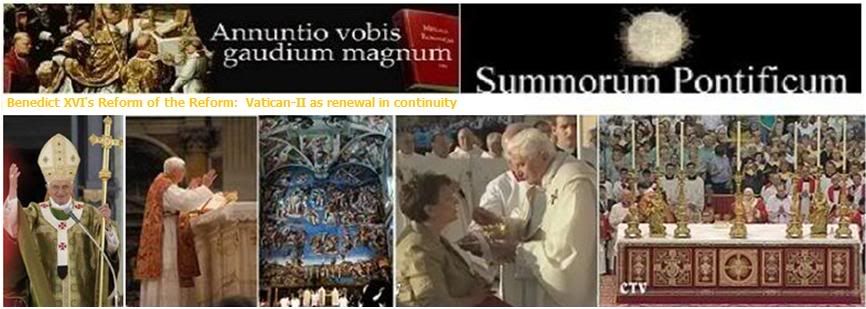 Ever ancient, ever new:
Ever ancient, ever new:
'Summorum Pontificum' and the young
Editorial
By George Neumayr

Issue of June 2010
Pope Benedict’s critics had hoped Summorum Pontificum would disappear without a trace. It hasn’t. His apostolic constitution authorizing wider use of the Traditional Latin Mass continues to bear fruit, some of it annoyingly visible to these critics.
Far from just a sop thrown to aging traditionalists, as some liberal bishops cast it, Summorum Pontificum has proven popular with the young.
As Pope Benedict noted in its accompanying letter, the Traditional Latin Mass is old in origin but new in appeal: “young persons too have discovered this liturgical form, felt its attraction, and found in it a form of encounter with the Mystery of the Most Holy Sacrifice particularly suited to them.”
An illustration of this appeared on April 24 in Washington, DC, when more than 3,500 people — many of them children, teens, college students, and young families — filed into the Basilica of the National Shrine of the Immaculate Conception for a Pontifical Solemn High Mass that lasted two and a half hours.

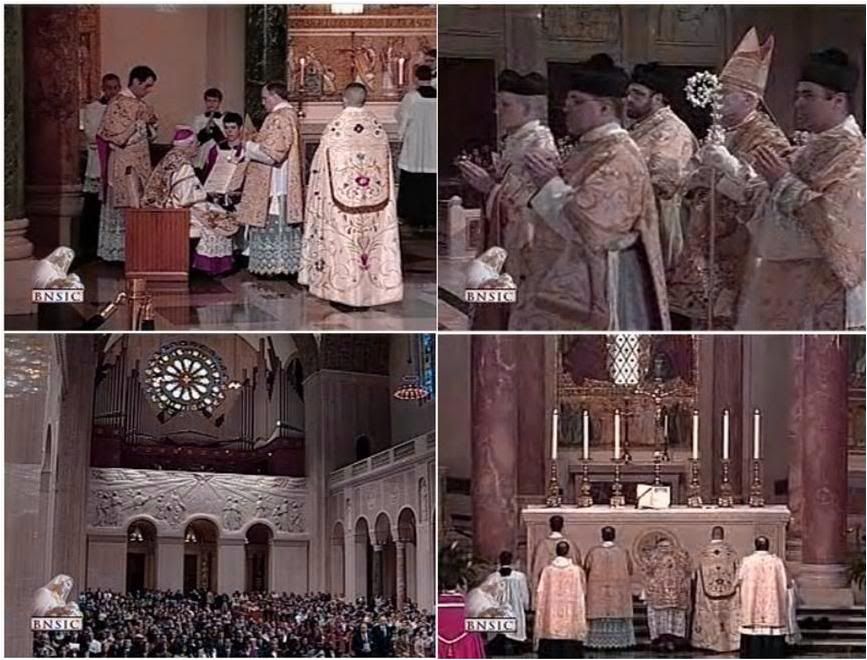
The Paulus Institute, which sponsored the event to mark the fifth anniversary of Benedict’s pontificate, said it was the first Traditional Latin Mass offered at the Shrine’s altar since 1965.
To the Catholic left, which presides over seminaries that look like ghost towns and preaches to pews that are almost empty, the sight of young Catholics flocking to this Traditional Latin Mass was more than a little discombobulating.
One of its publications, US Catholic, lashed out at the Mass. Usually an enthusiastic proponent of liturgies “relevant” to the young, it found this one disheartening.
Bryan Cones, managing editor of US Catholic, couldn’t help himself, blurting out in a blog entry:
I’ve been holding back all week for fear of stirring up a hornet’s nest, but my only response to the Latin Mass celebrated last Saturday at the Basilica of the Immaculate Conception in Washington has to be: Really? Seriously?
Who thought it was a good idea to dress up a bishop in a cappa magna and parade him around triumphantly in celebration of what Bishop Edward Slattery of Tulsa, Oklahoma, referred to as “the fifth anniversary of the ascension of Joseph Ratzinger to the throne of Peter” while the Church is in such a profound crisis of confidence in its leadership? Ascension to the throne, eh? Are we speaking of the “servant of the servants of God” here or the Emperor Augustus?
Showing utter contempt for a venerable Catholic tradition that centuries of saints and popes found spiritually edifying, Cone continued:
If we’re going to get stuck on a particular period in church history and its liturgy, does it have to be the 16th century? It was hardly a time of — how to put it? — liturgical modesty, much less the ‘noble simplicity’ that is, after all, the historical hallmark of the Roman rite. Unless His Excellency is going to wrap that cappa magna around his waist and start washing feet, as Jesus did in John’s gospel.
[The derision of liberal Catholics like Cones is not just a pathetic display of ignorance, but worse, of bigotry that is based solely on ideology! Unfortunately, it is idealogy - an ideology of personal convenience, 'primacy' of individual conscience ('Only I can know what is best for me and the rest of the world!') and utterly selfish arrogance - that rules these misgudied Catholics.]
Had the managing editor of US Catholic, which bills itself as being “In conversation with American Catholics,” conversed with any of the young ones at the Mass, he might have found out why it is “good idea” for the Church to maintain transcendent traditions.
What he snidely dismisses as absurd pomp, they see as powerful and otherworldly symbolism, which is far more “relevant” to their search for God than anything contained in the secularized and insipid “youth” liturgies US Catholic normally touts.
But if Cones distrusts their testimony, he could always talk to John Allen, chief reporter for the similarly-minded National Catholic Reporter. To his credit, Allen typically pursues the evidence wherever it leads, even if the evidence cuts against the liberal prejudices of his paper, as one of his recent findings about the general traditionalism of practicing young Catholics does:
The ministers of the Catholic future will be increasingly “evangelical.” The broad mass of twenty- and thirty-something Catholics today may be thoroughly secularized, but there is an inner core of faithful and practicing young Catholics who are the ones most likely to pursue a vocation to the priesthood or religious life, or to be most interested in making a career in the church as a lay person.
The future leaders of Catholicism in America will come from this inner core. By now there’s a considerable body of data about these “millennial Catholics,” and the consistent finding is that they’re more traditional in their attitudes and practices than the “Vatican II” generation they’re replacing.
These younger Catholics are attracted to traditional spiritual practices such as Eucharistic adoration and Marian piety; they have a generally positive attitude towards authority, especially the papacy; and they’re less inclined to be critical of church teaching….
Self-consciously “relevant” Catholicism as on display at US Catholic, with its pinched and hostile attitude to valuable traditions from the past and its feeble imitation of the world, has proven irrelevant to young Catholics who have left the Church and boring and off-putting to the ones who stay. They want bread, not stones, and Pope Benedict offers them that substance.
It was assumed that Pope Benedict principally wrote Summorum Pontificum for the old. He actually wrote it more for the young. He wanted them to know what many of their CCD teachers never taught them — that “what earlier generations held as sacred remains sacred for us too.”
[Modificato da TERESA BENEDETTA 17/06/2010 02:26] |
| |
|
| |
 16/06/2010 18:27 16/06/2010 18:27 |
|
| | | OFFLINE | | Post: 20.400
Post: 3.039 | Registrato il: 28/08/2005
Registrato il: 20/01/2009 | Administratore | Utente Master | |
|
 June 16, Wednesday, 11th Week in Ordinary Time
June 16, Wednesday, 11th Week in Ordinary Time
 ST. JEAN-FRANCOIS (John Francis) REGIS (France, 1597-1650),
ST. JEAN-FRANCOIS (John Francis) REGIS (France, 1597-1650),
Jesuit, Missionary and Preacher
Born to a wealthy family in southern France, Jean-Francois received a Jesuit education and joined the order at age 18. He was as diligent in prayers as he
was with his studies. After he was ordained,he did missionary work in various parts of rural France, preaching in plain language which attracted faithful of
every class. He spent mornings saying Mass and hearing confessions, and afternoons visiting prisons and hospitals. He was particularly solicitous of
prostitutes whom he persuaded to a new life, by having them trained as lacemakers. Taking note of his gifts, the Bishop of Viviers assigned him to
evangelize the diocese which was prey to various forms of Protestantism, and where many parishes had been deprived of the sacraments for two decades.
For the next 12 years, he carried out this 'internal mission', under punishing conditions in a desolate part of France, although what he really wanted was
to be a missionary to the Indians of North America. During this time, he earned a reputation as a 'saint'. To his dying day, he continued preaching and
organizing social services for prisoners, the sick and the poor. He was canonized in 1717. He is the patron saint of the Jesuits in France.
Readings for today's Mass:
www.usccb.org/nab/readings/061610.shtml
OR today.
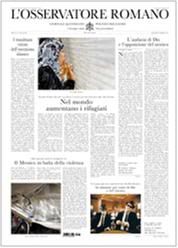 The only papal story in this issue was the brief item
The only papal story in this issue was the brief item
anticipating the opening yesterday afternoon of the
annual Diocesan Convention of Rome by the Holy Father
as Bishop of Rome (translated and posted yesterday
in the preceding page of this thread). But there is a
Page 1 commentary by Fr. Robert Imbelli on the Pope's
homily at the closing Mass of the Year for Priests.
Page 1 international news: An international report on
terrorist killings by Muslim extremists since 2001 shows
that more than 90% of victims have been Muslims; a UN
Commission for Refugees report says that the number of
refugees worldwide in 2009 reached 43.3 million - only
128,000 were legally resettled in 19 host countries.
And for some reason, the newspaper devotes at least
four articles on 'The Blues Brothers', a 1970 film with
a God message.
THE POPE'S DAY
General Audience today - The Holy Father's catechesis was on the teaching of St. Thomas Aquinas.
The Vatican announced today the official program for the Holy Father's pastoral visit to Sulmona
in the Abruzzo region of Italy on Sunday, July 4.
[Modificato da TERESA BENEDETTA 18/06/2010 15:54] |
| |
 16/06/2010 20:27 16/06/2010 20:27 |
|
| | | OFFLINE | | Post: 20.401
Post: 3.040 | Registrato il: 28/08/2005
Registrato il: 20/01/2009 | Administratore | Utente Master | |
|
 GENERAL AUDIENCE TODAY
GENERAL AUDIENCE TODAY
Catechesis #2 on
St. Thomas Aquinas
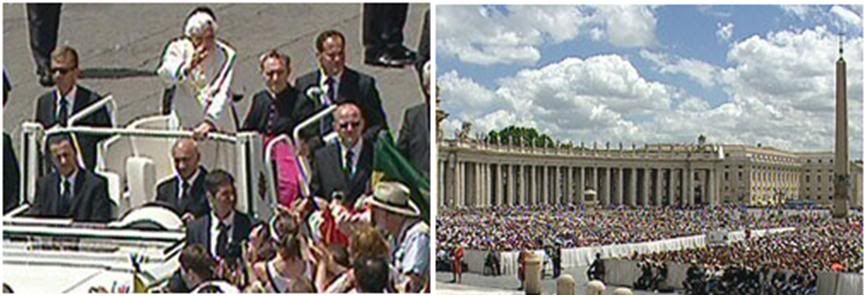
The Holy Father today gave a second catechesis on St. Thomas Aquinas, focusing this time on his teaching. Here is what he said in English:
Continuing our catechesis on the Christian culture of the Middle Ages, we turn to the teaching of Saint Thomas Aquinas, which the Church has consistently upheld as a model of sound theological method.
Thomas’s insistence on the harmony of faith and reason respected the autonomy and complementarity of these two ways of knowing the truth which has its ultimate origin in God’s Word.
Faith sheds fuller light on the truths which reason is naturally capable of knowing, while drawing from Revelation a supernatural knowledge of the divine mysteries and the Triune God himself.
Reason for its part serves to demonstrate faith’s credibility, to defend its teaching, and to show its inner consistency and intelligibility.
The complementary relationship between faith and reason reflects the truth that God’s grace builds on, elevates and perfects human nature, which is thus enabled to pursue the felicity which is its deepest desire.
Thomas’s conviction that we are naturally able to acknowledge the principles of the natural moral law remains timely, since that law, grounded in the truth of man’s nature, is the basis of respect for human dignity and universal human rights.
Saint Thomas is the patron of Catholic schools and universities; let us ask him to obtain for all of us the wisdom and understanding born of a deep and living Christian faith!
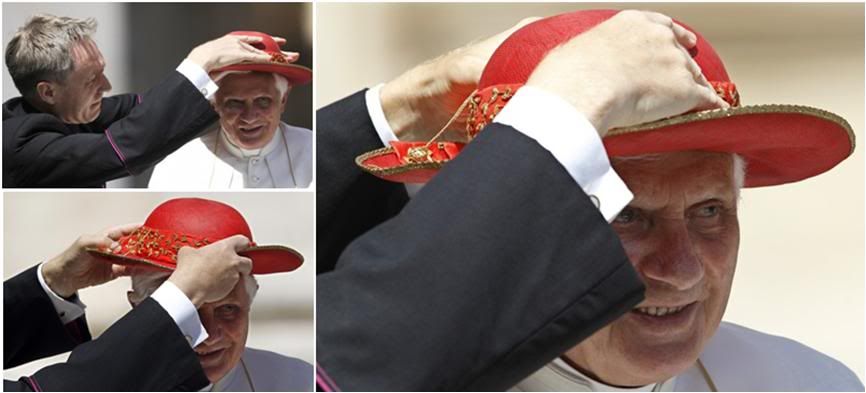
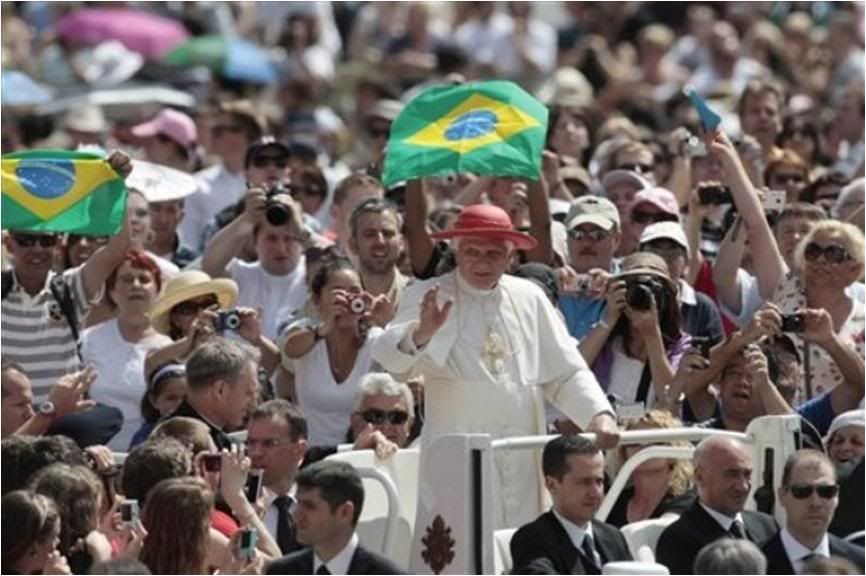
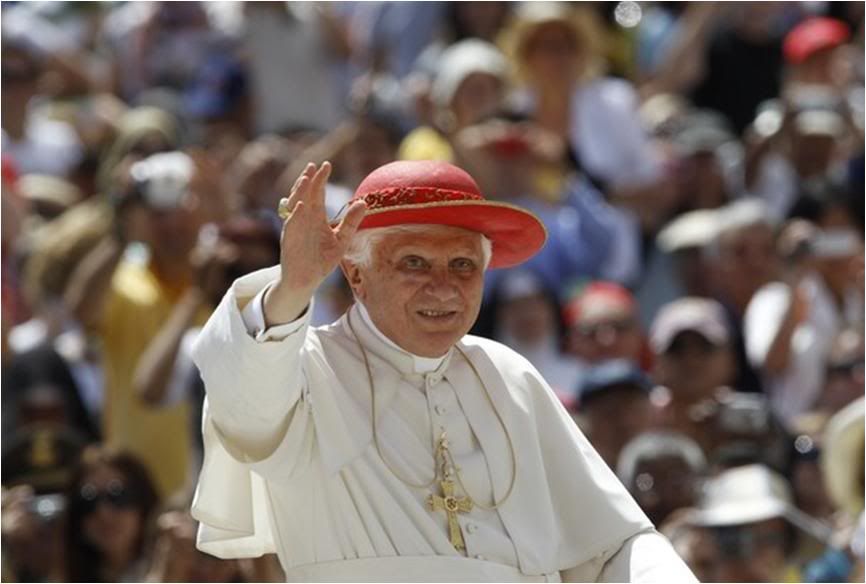
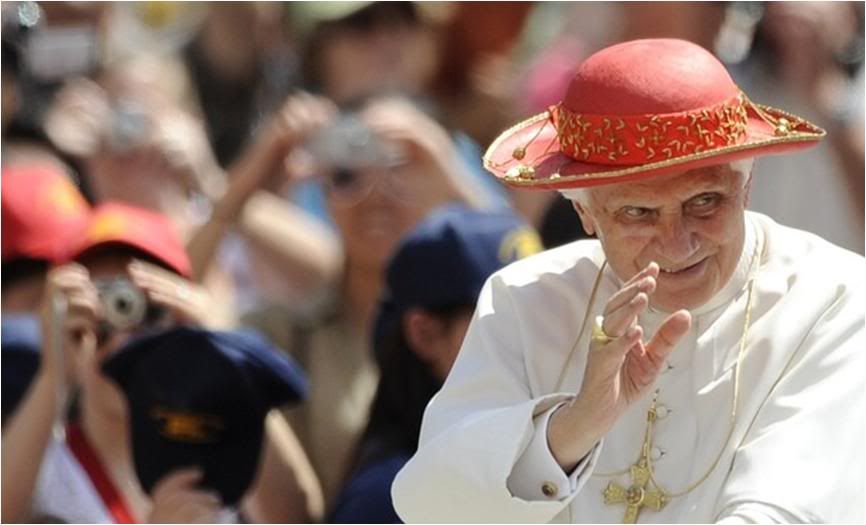
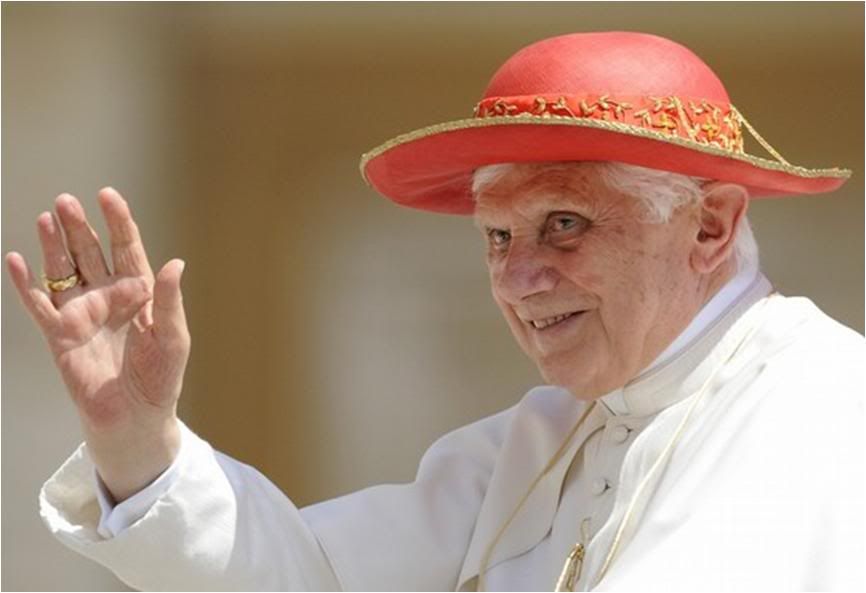
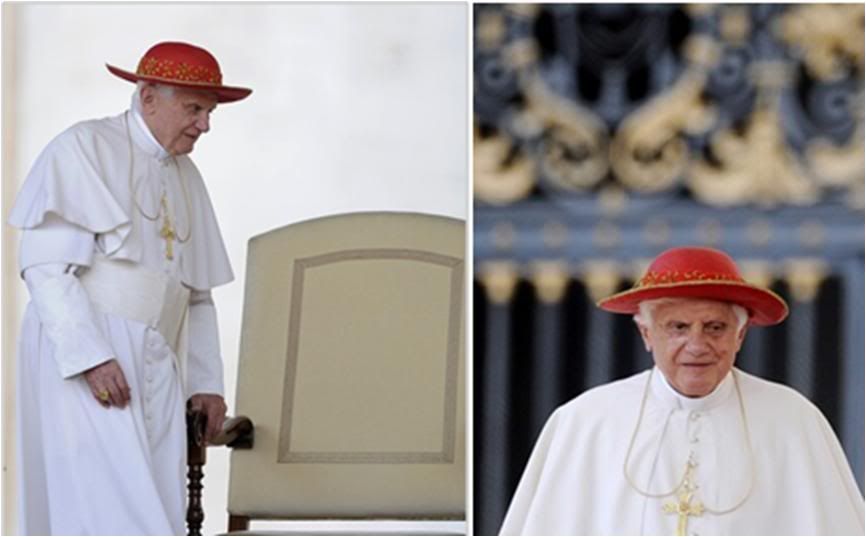
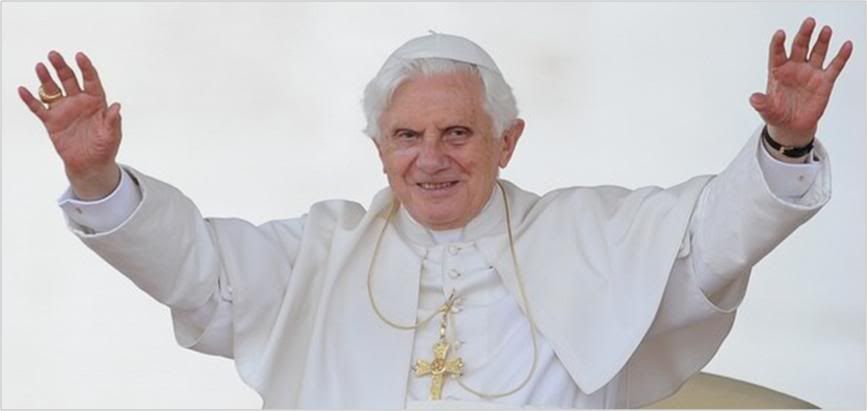
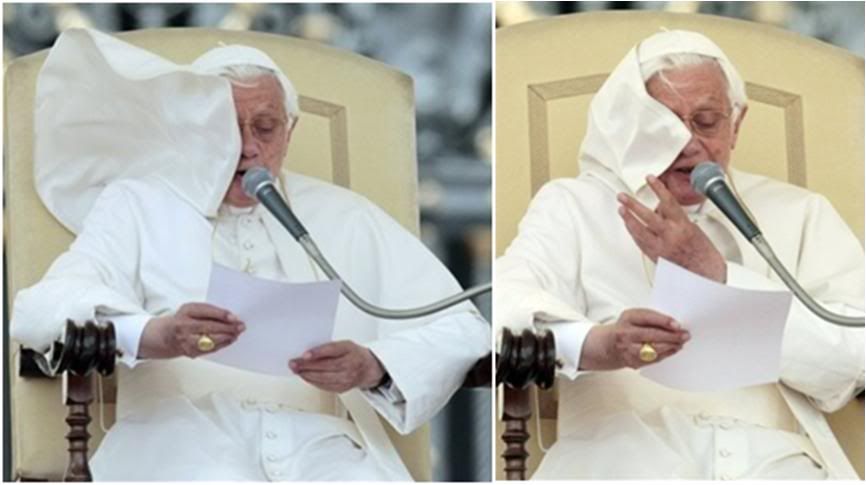
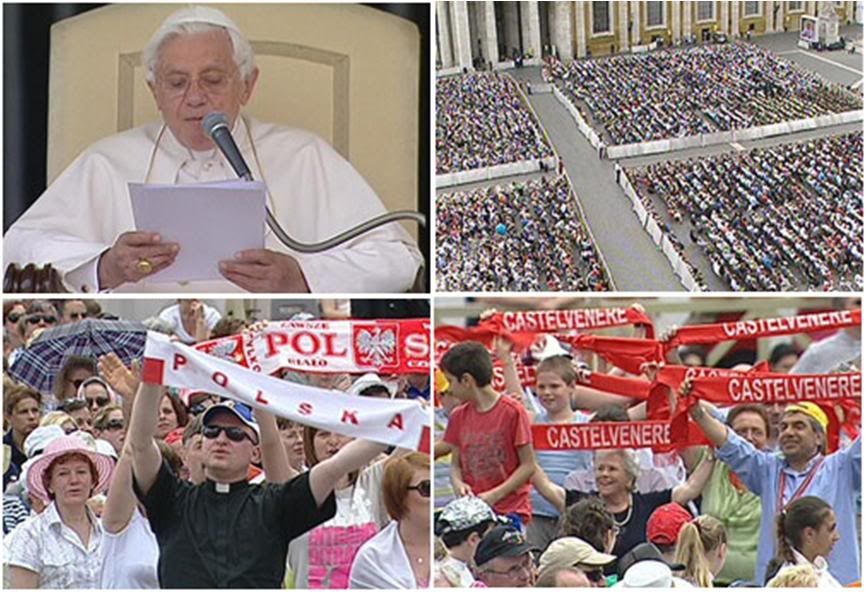 Here is a translation of the Holy Father's full catechesis:
Here is a translation of the Holy Father's full catechesis:
Dear brothers and sisters,
Today I would like to continue my presentation of St. Thomas Aquinas, s theologian of such importance that the study of his thought was explicitly recommended by the Second Vatican Council in two documents, the decree Optatam totius on the formation of priests, and the declaration Gravissimum educationis regarding Christian education.
Moreover, already in 1880, Pope Leo XII, who esteemed him greatly and was a great promoter of Thomistic studies, declared St. Thomas the patron of Catholic schools and universities.
The principle reason for this appreciation resides not only in the content of his teaching but also in the method he adapted - above all, his new synthesis and distinction of philosophy and theology.
The Fathers of the Church had found themselves confronting diverse philosophies of the Platonic type, in which a complete view of the world and of life was presented, including the question of God and of religion.
In confronting this philosophy, they themselves elaborated a complete view of reality, starting from faith and using elements of Platonism, in order to respond to the essential questions of men.
They called this view, based on Biblical revelation and elaborated with a Platonism corrected in the light of the faith, 'our philosophy'.
The word 'philosophy; was not, therefore, the expression of a purely rational system and, as such, distinct from the faith, but deriving form and thought from reason - a view which, certainly, went beyond their own capacity for reason, but was satisfying because of that.
For St. Thomas, the encounter with the pre-Christian philosophy of Aristotle (who died around 322 BC), opened a new perspective. Aristotelian philosophy was, obviously, a philosophy that had been elaborated without knowledge of the Old and New Testaments - it was an explanation of a world without revelation, by reason alone. This rationality was convincing.
So, for Thomas, the old form of 'our philosophy' as the Fathers called it, no longer worked. The relationship between philosophy and theology, between reason and faith, had to be rethought.
There was a 'philosophy' that was complete and convincing in itself, a rationality preceding faith; and then there was 'theology', which is thinking with the faith and in the faith.
The pressing question was this: Were the world of rationality, of philosophy that had been conceived without Christ, and the world of faith compatible? Or are they mutually exclusive?
There was no lack of thoses who affirmed the incompatibility of these worlds, but St. Thomas was firmly convinced that they were compatible - even that the philosophy that had been elaborated without Christ almost awaited the light of Christ in order to be complete.
This was the great 'surprise' of St. Thomas which determined his way as a thinker. To show the independence of philosophy and theology and, at the same time, their reciprocal relationship, was the historical mission of this great teacher.
Thus, it is understandable that in the 19th century, when the incompatibility of faith and reason was strongly proclaimed, Pope Leo XII designated St. Thomas as the guide for the dialog between one and the other.
In his theological work, St. Thomas assumed and concretized this relationship. Faith consolidates, integrates and illuminates the patrimony of truth that human reason can acquire. The trust that St. Thomas placed in these two instruments of knowledge - faith and reason - can be traced to his conviction that both come from the one spring or source of every truth, the divine Logos, which operates in the area of creation as it does in that of redemption.
Along with the accord between reason and faith, one must also recognize, on the other hand, that they employ cognitive processes that are different.
Reason accepts a truth by the force of its intrinsic evidence, mediated or not. Faith accepts a truth based on the authority of the Word of God that has been revealed.
St. Thomas writes at the start of his Summa Theologiae: "The order of science is double. Some proceed from principles known through the natural light of reason, like mathematics, geometry and similar sciences. Others proceed from principles known through a higher science, just as [architectural] perspective proceeds from principles known through geometry, and music from principles known through mathematics.
In this way, sacred doctrine -that is, theology - is a science because it proceeds from principles known through the light of a higher science, namely, the science of God and the saints" (I, q. 1, a. 2).
This distinction assures the autonomy of the human sciences as well as the theological sciences. But this is not equivalent to separation - rather, it implies a reciprocal and advantageous collaboration.
Faith, in fact, protects reason from every temptation to mistrust its own capacity. It stimulates it to open itself to ever wider horizons; it keeps alive the search for the fundamental, and when reason applies itself to the supernatural sphere of the relationship between God and man, it enriches its own work.
According to St. Thomas, for example, human reason can undoubtedly arrive at affirming the existence of one God, but only faith, which accepts divine revelation, is capable of drawing (good) from the mystery of the love of the One and Triune God.
On the other hand, it is not just faith that helps reason. Reason too, with its means, can do something important for faith, by rendering the triple service that St. Thomas summarizes in the Proemium of his commentary on Boetius's De Trinitate: "To demonstrate the foundations of the faith; to explain through metaphors the truths of the faith; and oppose the objections raised against faith" (q. 2, a. 2).
The entire history of theology is, basically, the exercise of this commitment of intelligence which shows the intelligibility of faith, its articulation and internal harmony, its reasonableness, and its capacity to promote the good of man.
The correctness of theological reasonings and their real cognitive significance are based on the value of theological language which, according to St. Thomas, is principally an analogical language.
The distance between God, the Creator, and his creatures, is infinite, the dissimilarities always much more than the similarities (cfr. DS 806). Despite this, in all the difference between Creator and creature, there is an analogy between being created and the being of the Creator who allows us to speak with human words about God.
St. Thomas founded the doctrine of analogy, more than just on exquisitely philosophical arguments, but also on the fact that with Revelation, God speaks to us and has thus authorized us to speak of him.
I think it is important to reclaim this doctrine. In fact, it helps us to overcome some of the objections of contemporary atheism which denies that religious language has an objective significance, and sustains instead that it only has a subjective or simply emotive value.
This objection results from the fact that positivistic thinking is convinced that man does not know 'being' itself, only the experimentable functions of reality.
With St. Thomas and with the great philosophical tradition, we are convinced that, in reality, man knows not only the functions - object of natural sciences - but also knows something about 'being' itself: For example, he knows the person, the You of the other, and not only the physical and biological aspect of his being.
In the light of this teaching of St. Thomas, theology affirms that, for all its limitations, religious language is endowed with sense - because we touch being - like an arrow that is aimed at the reality which it signifies.
This fundamental accord between human reason and Christian faith is also seen in another basic principle of Aquinas thought: divine grace does not nullify, but it supposes and perfects, human nature. The latter, in fact, even after sin, is not completely corrupted but wounded and weakened.
The Grace lavished by God and communicated through the Mystery of the Word incarnate is an absolutely gratuitous gift with which nature is healed, potentiated and helped to follow the innate desire in the heart of every man and every woman: happiness. All the faculties of the human being are purified, transformed and elevated by divine Grace.
An important application of this relationship between nature and Grace is seen in the moral theology of St. Thomas Aquinas, which is of great relevance now. At the center of his teaching in this field, he places the new law, which is that of the Holy Spirit.
With a profoundly evangelical view, he insists on the fact that this law is the Grace of the Holy Spirit given to all who believe in Christ. To this Grace is joined the written and oral teaching of doctrinal and moral truths transmitted by the Church.
St. Thomas, underscoring the fundamental role in moral life of the action of the Holy Spirit, of Grace from which flow the theological and moral virtues flow, makes us understand that every Christian can reach the high perspectives of the Sermon on the Mount if he lives an authentic relationship of faith in Christ, if he is open to the action of the Holy Spirit.
But, Aquinas adds, "even if Grace is more effective than nature, nonetheless nature is more essential for man" (Summa Theologiae, ia, q. 29, a. 3), for whom, in the Christian moral perspective, there is a place for reason, which is able to discern the natural moral law.
Reason can recognize it, considering that which is good to do from that which must be avoided, in order to achieve that happiness which everyone wants at heart and that also imposes a responsibility towards others, and therefore, a quest for the common good.
In other words. man's virtues, theological and moral, are rooted in human nature. Divine Grace accompanies, sustains and urges ethical commitment but, by itself, according to St. Thomas, all men - believers or not - are called to recognize the demands of human nature expressed in natural law, and to be inspired by it in formulating positive laws, namely, those issued by civilian and political authorities to regulate human coexistence.
When natural law and the responsibility it implies are denied, then life opens itself tragically to ethical relativism on the individual level, and to the totalitarianism of the State on the political plane.
The defense of the universal rights of man and the affirmation of the absolute value of personal dignity postulate a foundation. Is it not precisely natural law itself that is this foundation, with the non-negotiable values that it indicates?
In his encyclical Evangelium vitae, Venerable John Paul II wrote words that remain of great relevance: "It is urgent, therefore, for the future of society and the development of a healthy democracy, to rediscover the existence of human and moral values that are essential and innate, which come from the truth itself of the human being, and express and protect the dignity of the person: values which, therefore, no individual, no majority and no state could ever create, modify or destroy, but must only be acknowledged, respected and promoted" (No. 71).
In conclusion, Thomas offers us a concept of human reason that is broad and trustful: broad because it is not limited to the spaces of the so-called empirico-scientific reason, but open to all of being, and therefore, even to the fundamental and irrenunciable questions of human life; and trustful because human reason, especially when it accepts the inspirations of Christian faith, promotes a civilization that recognizes the dignity of the person, the untouchability of his rights and the cogency of his duties.
It is not surprising that the doctrine on personal dignity, which is fundamental for the recognition of the inviolability of human rights, matured in the circles of thought that took in the legacy of St. Thomas Aquinas, who had a very elevated concept of human nature.
He defined it, with his rigorously philosophical language, as "that which is most perfectly found in all of nature, namely, a subject that subsists in a rational nature" (Summa Theologiae, Ia, q. 29, a. 3).
The profundity of St. Thomas Aquinas's thinking comes forth - let us never forget this - from his sincere faith and his fervent piety, which he expressed in inspired prayers, as this one in which he asks God, "Grant, I pray to you, the will to seek you, the wisdom to find you, a life to please you, a perseverance that awaits you with trust, and a trust which in the end will lead to possessing you".
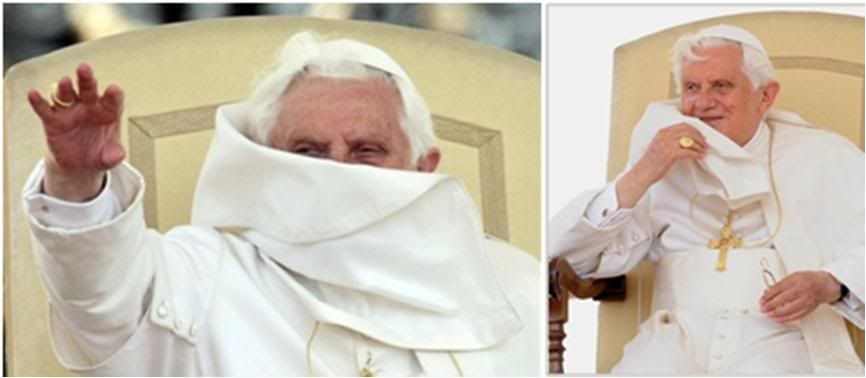
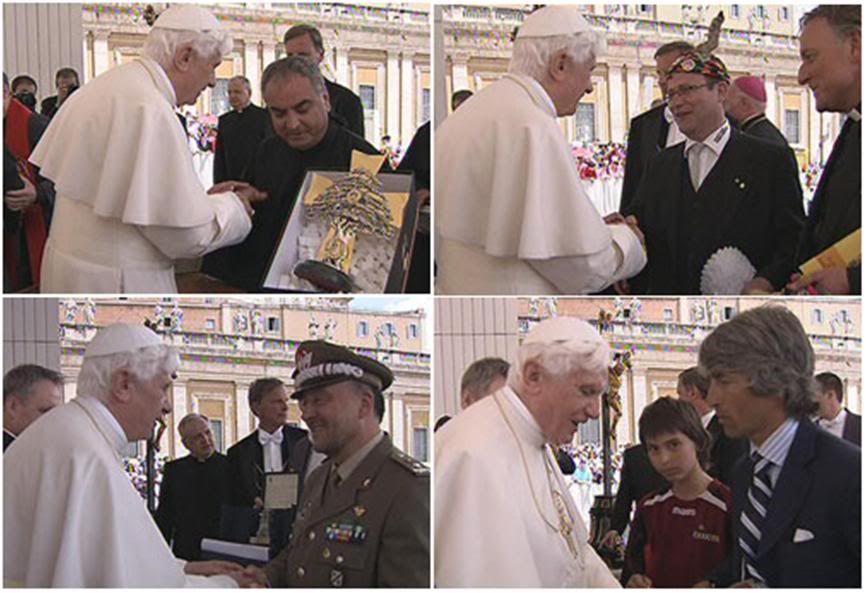
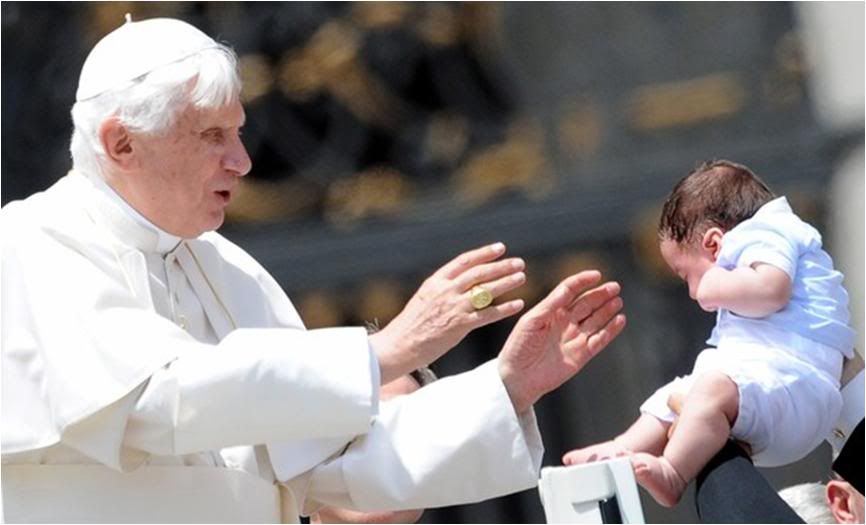
[Modificato da TERESA BENEDETTA 17/06/2010 11:04] |
| |
 16/06/2010 23:02 16/06/2010 23:02 |
|
| | | OFFLINE | | Post: 20.402
Post: 3.041 | Registrato il: 28/08/2005
Registrato il: 20/01/2009 | Administratore | Utente Master | |
|

 The Vatican and the Diocese of Sulmona-Valva today released the final program for the Pope's coming visit.
The Vatican and the Diocese of Sulmona-Valva today released the final program for the Pope's coming visit.
PASTORAL VISIT OF HIS HOLINESS BENEDICT XVI
TO SULMONA, Sunday, July 4, 2010
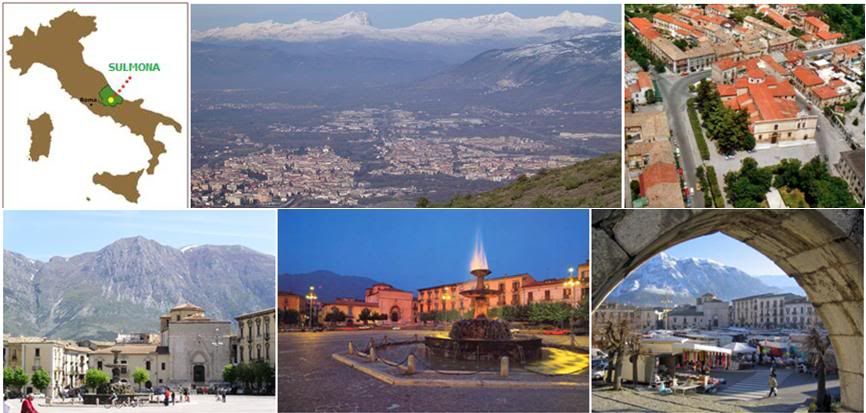 P R O G R A M
08:30 The Holy Father leaves the Vatican heliport.
P R O G R A M
08:30 The Holy Father leaves the Vatican heliport.
Before landing in Sulmona, the chopper will fly over
the Abbey of Santo Spirito and the Hermitage of S. Onofrio sul Morrone.
09:20 Landing at the Serafini sports field in Incoronata outside Sulmona.
The Holy Father will be welcomed by
- Mons. Angelo Spina, Bishop of Sulmona-Valva
- Gianni Letta, Undersecretary to the Prime Minister's Cabinet
- Antonio Zanardi Landi, Ambassador of Italy to the Holy See
- Mons. Giuseppe Bertello, Apostolic Nuncio in Italy
- Gianni Chiodi, President of the Abruzzo region
- Giovanna Maria Rita Iurato, Prefect of L'Aquila
- Fabio Federico, Mayor of Sulmona
- Antonio Del Corvo, President of L’Aquila province
Travel by Popemobile to Piazza Garibaldi,
passing through Viale Mazzini and Corso Ovidio.
After passing through the various crowd sectors, the Holy Father will
receive a formal welcome from
the Mayor and the Bishop of Sulmona.
10.00 EUCHARISTIC CONCELEBRATION at Piazza Garibaldi
- Homily by the Holy Father
- Angelus
12.30 After the Mass, the Holy Father will take the Popemobile to the
Centro Pastorale Diocesano.
He will inaugurate the Casa Sacerdotale (House for Priests), where the Holy Father will rest
after lunch. This was recently restored and will be named for Benedict XVI. It is meant
as a home for sick and aged priests.
13.15
Lunch with the bishops of the region, Casa Sacerdotale
16:30 Still at Casa Sacerdotale, the Pope will meet a delegation from the Casa Circondiale
(municipal jail), including the director, the chaplain, the custodial agents, and some inmates.
16:45 The Pope will proceed to the Cathedral in the Popemobile, passing through Via Roosevelt,
Piazza Tresca and Via Matteotti.
17:00 MEETING WITH DIOCESAN YOUTH, Cathedral of San Panfilo.
- Adoration of the Blessed Sacrament
- Introduction from Bishop Spina
- Greeting from youth representatives Francesca Orsatti and Cristian DiSanza
- Address by the Holy Father
The Holy Father will descend to the Cathedral Crypt to venerate the relics of San Panfilo and
Pope St. Celestine V.
17:30 The Holy Father leaves the Cathedral and proceeds to the nearby Communal Stadium.
Before boarding the helicopter, he will say farewell to the same officials who welcomed
him in the morning.
17:45 Departs Sulmona for Rome.
18:35 Arrival at the Vatican.
The Diocese of Sulmona has has one of the most informative and resourceful sites preparatory to a papal visit, which comes as the Diocese celebrates the eighth centenary of the death of Pope st. Celestine V. The activities and initiatives in connection with that anniversary are equally remarkable and deserve a separate post.
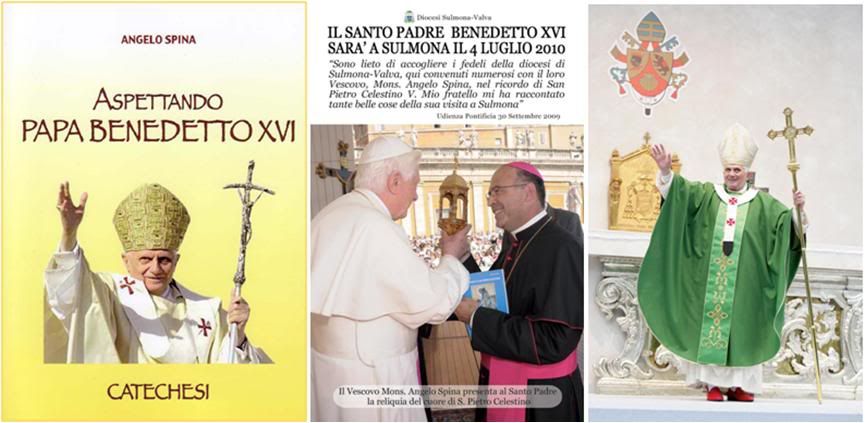 The diocese has now come out with a 90-page handout booklet containing in Part I some basic Catechesis on the Catholic Church and in Part II, passages from the Magisterium of Benedict XVI. It is also well illustrated with photos of Benedict XVI (though most are in B&W).
The diocese has now come out with a 90-page handout booklet containing in Part I some basic Catechesis on the Catholic Church and in Part II, passages from the Magisterium of Benedict XVI. It is also well illustrated with photos of Benedict XVI (though most are in B&W).
The diagrams for the Mass in Piazza Garibaldi on July 4 are equally well illustrated:
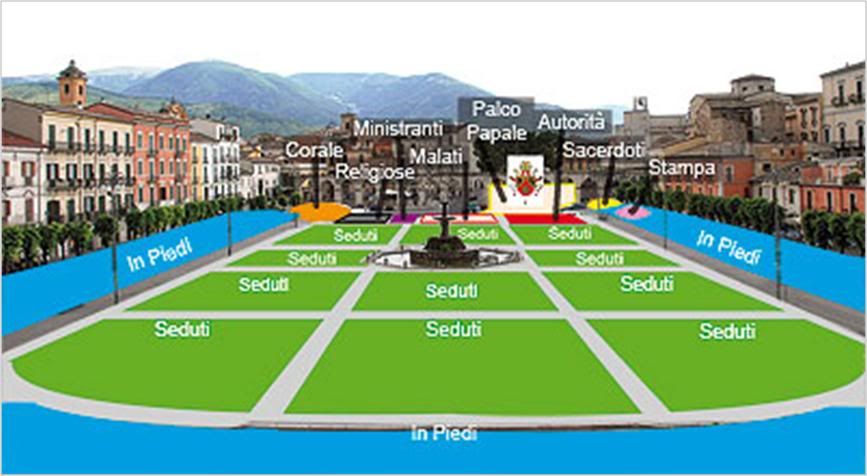 Green areas are for seated Massgoers; the blue areas are for standees. Places for the choir, the sick, special guests,
Green areas are for seated Massgoers; the blue areas are for standees. Places for the choir, the sick, special guests,
press, etc next to the Papal tribunal/altar are also clearly designated.
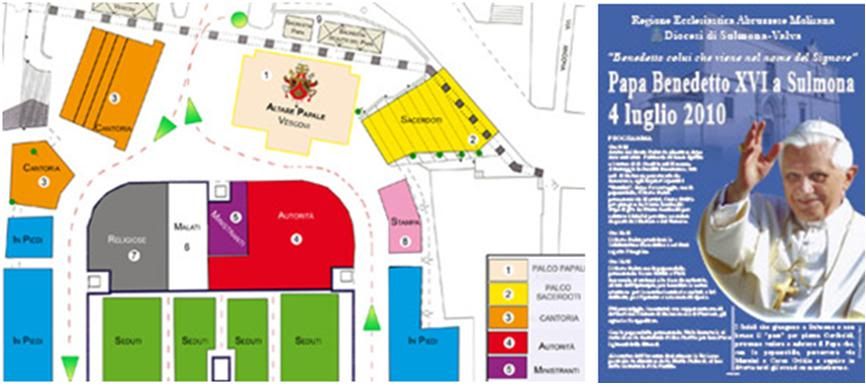
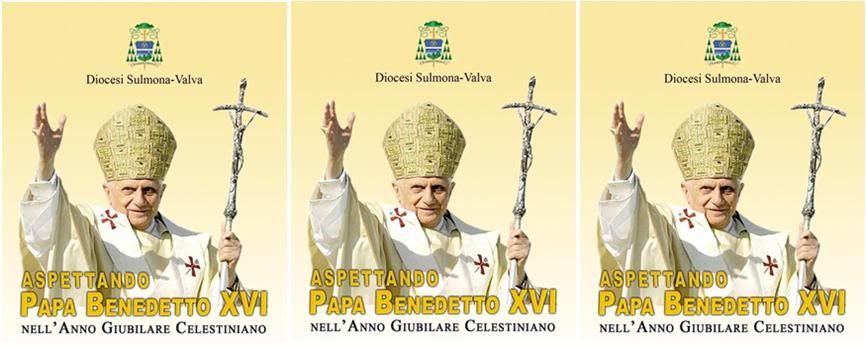
[Modificato da TERESA BENEDETTA 17/06/2010 02:03] |
| |
 17/06/2010 01:02 17/06/2010 01:02 |
|
| | | OFFLINE | | Post: 20.403
Post: 3.042 | Registrato il: 28/08/2005
Registrato il: 20/01/2009 | Administratore | Utente Master | |
|


![[SM=g9433]](https://im0.freeforumzone.it/up/0/33/2103559.gif) ![[SM=g9433]](https://im0.freeforumzone.it/up/0/33/2103559.gif) ![[SM=g9433]](https://im0.freeforumzone.it/up/0/33/2103559.gif) ![[SM=g9433]](https://im0.freeforumzone.it/up/0/33/2103559.gif) ![[SM=g9433]](https://im0.freeforumzone.it/up/0/33/2103559.gif) One advantage of starting my Forum 'workday' late is that by the time I get around to posting, some stories in the Italian media have already made it to the Anglophone media, which spares me from having to translate, picking up bits and pieces... Anyway, this is more a harmless fantasy than fact, though it would be nice if something like this happened once in a while.
'Hungry Pope sneaks out
One advantage of starting my Forum 'workday' late is that by the time I get around to posting, some stories in the Italian media have already made it to the Anglophone media, which spares me from having to translate, picking up bits and pieces... Anyway, this is more a harmless fantasy than fact, though it would be nice if something like this happened once in a while.
'Hungry Pope sneaks out
for a snack' - or did he?

ROME, June 16 - Pope Benedict XVI reportedly snuck out of the Vatican in secret to enjoy a bite to eat at a nearby restaurant.
The Pontiff, who is normally guarded by a huge security entourage, reportedly tucked in to a fish dinner in a small, family restaurant 150 yards from the Vatican walls, Italian media reported today.
He apparently timed his unofficial trip to coincide with the Italian soccer team's first World Cup game against Paraguay so that he could slip unnoticed through the empty streets as locals concentrated on the game.
The claims, confirmed by a shocked waiter, were the subject of fevered speculation in the Italian media after they first appeared in a gossip column yesterday.
However bosses at the Al Passetto di Borgo, reportedly one of Benedict's favorite dining haunts before his ascent to the papacy, dismissed the claims today, Italian news agency ANSA said.
The restaurant’s manager also scoffed at suggestions that the Pope would order sole, claiming the 83-year-old Pontiff preferred to eat spaghetti carbonara or German dishes.
"Vatican sources" also poured scorn on the suggestions, which appeared in the Italian paper, Il Foglio [a one-line mention in somebody's column], telling ANSA they were "entirely untrue".
The sources said there were no specific rules preventing the Pope from popping out for a bite to eat but said he had simply not chosen to do so since taking office.
However they told ANSA that his predecessor, John Paul II, had regularly 'escaped' the Vatican for walks in the countryside around Rome.
[The item faithfully reports what was said in the Italian papers.
Anyway, if the Pope wanted to eat a good sole dish, I'm sure the Memores could whip up one for him easily - or he could send out for it, even. One imagines, too, that he would much rather spend his spare time at the piano, or reading, or writing, than playing 'truant' for an hour!]
[Modificato da TERESA BENEDETTA 19/06/2010 02:36] |
| |
 17/06/2010 01:29 17/06/2010 01:29 |
|
| | | OFFLINE | | Post: 20.404
Post: 3.042 | Registrato il: 28/08/2005
Registrato il: 20/01/2009 | Administratore | Utente Master | |
|


 Further to the story first posted yesterday (on the preceding page of this thread) from the official website for the UK visit:
Catholic Church launches guide
Further to the story first posted yesterday (on the preceding page of this thread) from the official website for the UK visit:
Catholic Church launches guide
to Pope’s visit amid fears
over current ‘controversies’
By Martin Beckford, Religious Affairs Correspondent

June 16, 2010
The Roman Catholic hierarchy has launched a PR campaign ahead of the Pope’s visit to Britain, amid fears that the public associates the Church with child abuse.
A new booklet aims to explain the purpose and importance of the papal trip and the Church’s contributions to society for those who are only aware of “current controversies”.
The head of Catholics in England and Wales, The Most Rev Vincent Nichols, said that the four-day tour in September will be a “very significant moment” for the country particularly in straitened economic times.
The Archbishop of Westminster said: “People that I speak to recognise that as a society we are entering into a period, maybe a prolonged period, which is going to be difficult. In times of difficulty, we need all the inner resources that we can muster and the resource of religious faith is a crucially important one for giving society stability and generosity, especially in times of financial constraint.
“People recognise that and therefore they recognise the importance and sensitivity of the message of the Pope, who will wish to say that faith in God is not a problem but a gift to be received.”
Benedict XVI has been invited by the Queen for the first state papal visit to Britain since the Reformation, but the historic trip has faced a series of setbacks.
The Catholic Church worldwide has been beset by allegations of clerical sex abuse dating back decades, prompting high-profile calls for the Pontiff to be arrested upon arrival. [It is intellectually dishonesT to report this 'with a straight face', as it were, knowing full well that it is an absurd stunT without any remotely valid basis. It is conceding effectively that the sick fantasy of the crush-the-Pope-at-any cost Hitchkins nuts is 'valid' outside cuckko-land]
Meanwhile concerns have been raised about the cost of the visit to taxpayers and churchgoers, raising fears that some public events will have to be scaled back.
About 300,000 copies of the new 32-page booklet are being printed and distributed to journalists, civil servants and council officials as well as every parish, in an attempt to set out clearly what the trip will involve and what the Church stands for.
It states: “It is not easy to convey the richness of the tradition of Catholic thought, and Catholicism can easily become defined in the public mind in the light of one or two current controversies. This is the gap in public knowledge that this pamphlet aims to address.”
It explains the history of relations between the Vatican and the British monarchy – which had “painful consequences” after Henry VIII’s split from Rome – as well as Catholic social teaching on poverty and relations with other Christian denominations and different faiths.
The booklet addresses “the scandal of child abuse committed by clergy” but insists safeguarding has become a “permanent part of the life of the Catholic Church”.
It also explains the significance of Cardinal Newman, the Victorian convert to Rome who will be beatified by the Pope during his visit. Cardinal Newman’s motto – Heart Speaks Unto Heart – has been adopted as the title for the papal visit.
A detailed itinerary is expected to be disclosed next month, after a Vatican delegation decides on the Pope’s exact movements, but Archbishop Nichols said the plan was still for the beatification Mass to take place at Coventry Airport.
In the same newspaper, Damian Thompson finds the booklet 'embarassing'. And I thought it was a commendable initiative. However, he gives some reasons I have not had time to check out.
Official booklet launched for Pope's
visit - and it's an embarrassment

June 15th, 2010
One of these days I promise to say something constructive about the planning for the papal visit, but I’m afraid the official booklet launched today is just an embarrassment. There’s a glancing reference on page 24 to the Holy Father beatifying John Henry Newman at Coventry Airport, but no more details are provided – just as well, perhaps, since that venue has been thrown into doubt by the incompetence of the visit organisers.
You will, however, find plenty of guff about how the Vatican is the world’s first carbon-neutral state, a photograph of American trade unionists on a march and a description of Newman as a “moderate” Catholic as opposed to “more extreme Catholics like Frederick Faber and W G Ward”.
Plus much PC boasting by the agencies of the Bishops’ Conference, a front cover that a Telegraph colleague describes as “like something out of a 1980s computer game” and lots and lots of typos. (Hardly surprising, given that the publishers are responsible for the Universe and Catholic Times newspapers.)
As for the press conference to launch the booklet, questions about the major Catholic events, which were unambiguously the responsibility of the Church in Britain, were batted away with references to the Vatican, the Foreign Office, the Government, Lord Patten and Health and Safety regulations.
“All very evasive,” says a journalist who was there. (Also evasive: Mgr Andrew Summersgill, who was otherwise occupied. Hmm.) The impression given was that the bishops are still hoping to book Coventry airport and spend no more than £7 million. But don’t bet on it, because the gulf between what’s really happening and what the Church chooses to tell the media, wide at the best of times, has never been greater.
Perhaps Thompson can feel a bit more charitable and try praying for the organizers so they end up doing the right things, after all these bad starts!
 The release of the booklet and the so-called logo for the visit yesterday was accompanied by much hype about Brian Clarke, the artist responsible for the logo and described as 'the world's leading artist in stained glass'. That may be so, but the design can hardly be called striking, memorable, or even expressing the idea of the papal visit itself or the motto! And even the official site for the visit itself has not yet adapted the 'logo' or posted it anywhere on the site other than the cover picture of the booklet. (As you can see from the 'frieze' above, it does not reduce very well
The release of the booklet and the so-called logo for the visit yesterday was accompanied by much hype about Brian Clarke, the artist responsible for the logo and described as 'the world's leading artist in stained glass'. That may be so, but the design can hardly be called striking, memorable, or even expressing the idea of the papal visit itself or the motto! And even the official site for the visit itself has not yet adapted the 'logo' or posted it anywhere on the site other than the cover picture of the booklet. (As you can see from the 'frieze' above, it does not reduce very well
The Cyprus organizers had a much more efficient, attractive and meaningful logo! And you could tell how much thought went into the Portugal logo, which was adapted to multiple versions. How is it that the US and the UK - which are supposed to have the world's most creative advertising minds - ended up with rather pedestrian logos for their respective papal visits?
[Modificato da TERESA BENEDETTA 17/06/2010 02:06] |
| |
 17/06/2010 14:00 17/06/2010 14:00 |
|
| | | OFFLINE | | Post: 20.405
Post: 3.044 | Registrato il: 28/08/2005
Registrato il: 20/01/2009 | Administratore | Utente Master | |
|

 The illustration for the diocesan program cover is the fresco of St. Stephen painted by Fra Angelico in the Nicoline Chapel of the Apostolic Palace. It shows Stephen being ordained as a deacon and then distributing alms to Rome's poor as part of his duties. It illustrates the link between liturgy and charity that it the theme of the diocesan convention for 2010-2011.
Message for the Diocese
The illustration for the diocesan program cover is the fresco of St. Stephen painted by Fra Angelico in the Nicoline Chapel of the Apostolic Palace. It shows Stephen being ordained as a deacon and then distributing alms to Rome's poor as part of his duties. It illustrates the link between liturgy and charity that it the theme of the diocesan convention for 2010-2011.
Message for the Diocese
from the Bishop of Rome:
The Eucharist enables
sharing and solidarity
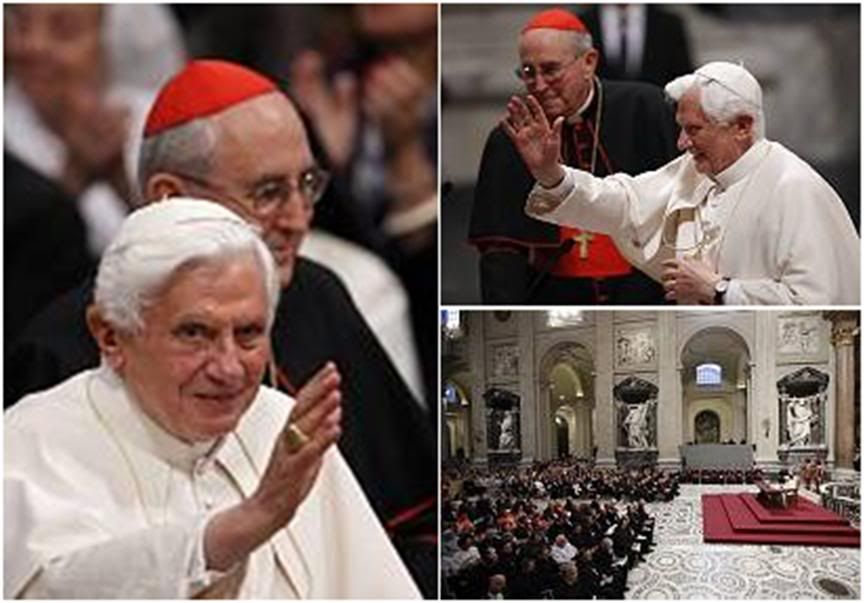 Here is a translation of the address delivered by the Holy Father Tuesday afternoon to the annual Diocesan Convention for the Diocese of Rome to finalize the pastoral plan for the coming pastoral year. This was first reported June 15 on the preceding page, but the text of the Pope's address was not available at the time. It is another remarkable address, very much like a homily on the theme of the Sunday Eucharist and the eucharistic witness of charity :
Here is a translation of the address delivered by the Holy Father Tuesday afternoon to the annual Diocesan Convention for the Diocese of Rome to finalize the pastoral plan for the coming pastoral year. This was first reported June 15 on the preceding page, but the text of the Pope's address was not available at the time. It is another remarkable address, very much like a homily on the theme of the Sunday Eucharist and the eucharistic witness of charity :
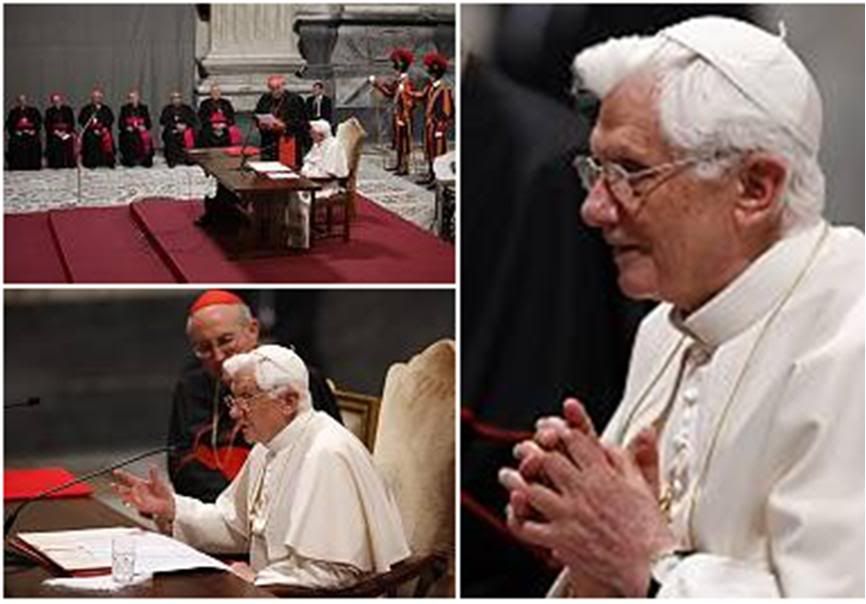
Dear brothers and sisters!
The Psalm says, "How good it is, how pleasant, where the people dwell as one!" (Ps 133,1).
It is really so. It's a reason for great joy for me to be back with you and to share all the good works that the parishes and other ecclesial organisms in Rome have achieved in the past pastoral year.
With fraternal affection I greet the Cardinal Vicar (Agostino Vallini) and thank him for the kind words he addressed to me and for his daily commitment in governing the diocese and his support for priests and the parish communities.
I greet the Auxiliary Bishops, the entire priesthood, and each of you, awith a heartfelt thought to those who are sick and in particular difficulties, assuring them of my prayers.
As I reminded Cardinal Vallini, we have been committed since the past year to verifying ordinary pastoral work in the diocese. This evening, we will reflect on two points of primary importance: "Sunday Eucharist and the testimony of charity".
I am familiar with the great work that parishes, associations and movements have achieved, through activities of training and dialog, to examine in depth and to better live these two fundamental components of the life and mission of the Church and of every single believer.
This has also favored that pastoral co-responsibility which, in the diversity of ministries adn charisms, should always be disseminated if we truly wish the Gospel to reach the heart of every Roman. So much has been done, and we thank the Lord for it; But still much more remains to be done, always with his help.
Faith can never be taken for granted, because every generation needs to receive this gift through the announcement of the Gospel, to know the truth that Christ has revealed to us. Thus the Church is always committed to propose the entire deposit of faith.
That includes the doctrine of the Eucharist - the central mystery which contains "all the spiritual good of the Church, namely, Christ himself, our Easter" (Conc. Ecum. Vat. II, Decr. Presbyterorum ordinis, 5).
A doctrine which today, unfortunately, is not sufficiently understood in its profound value and its relevance to the existence of believers.
That is why it is important that a more profound knowledge of the mystery of the Body and Blood of the Lord must be felt as a need, in the different communities of our Diocese of Rome.
At the same time, following the missionary spirit that we wish to nourish, it is necessary to spread the commitment to announce this Eucharistic faith, so that every man may encounter Jesus Christ who has shown us 'the God who is near', a friend of mankind, and to bear witness to him with an eloquent life of charity.
In all his public life, Jesus, through preaching the Gospel and miraculous signs, announced the goodness and mercy of the Father towards man. This mission culminated on Golgotha, where the crucified Christ revealed the face of God, so that man, contemplating the Cross, could recognize the fullness of love (cfr. Benedetto XVI, Enc. Deus caritas est, 12).
The sacrifice on Calvary was mysteriously anticipated in the Last Supper, when Jesus, sharing bread and wine with the Twelve, transformed it into his Body and Blood, which he would offer later as the immolated Lamb.
The Eucharist is the commemoration of the death and resurrection of Jesus Christ, of his love to the very end for each of us - a commemoration that he entrusted to the Church so that it would be celebrated for centuries.
According to the meaning of the Jewish verb 'zakar', this memorial is not just a remembrance of something that took place in the past, but a celebration that makes the event actual in a way that reproduces its salvific power and efficacy.
Thus, "it renders present and actual the sacrifice that Christ offered the Father on the Cross, once and for all, for the good of mankind" (Compendium of the Catechism of the Catholic Church, 280).
Dear brothers and sisters, in our time, the word 'sacrifice' is not liked - rather, it is thought to belong to other eras and to a different way of understanding life. But, well understood, sacrifice is and remains fundamental, because it reveals to us the love with which God, in Christ, loves us.
In the offering Jesus makes of himself, we find all the novelty of Christian worship. In ancient times, men offered animals or the first fruits of the land as a sacrifice to their divinities. Jesus instead offered himself, his body and his entire existence: He himself in person becomes the sacrifice that the liturgy offers in the Holy Mass. Indeed, with the consecration, the bread and wine become his true Body and Blood.
St. Augustine invited his faithful not to dwell on what appears to their eyes, but to go beyond: "Recognize in the bread", he wrote, "the same body that hung on the Cross, and in the chalice, the same blood that gushed forth from his side" (Disc. 228 B, 2).
To explain this transformation, theology coined the word 'trans-substantiation', a word that first resounded in this Basilica during the fourth Lateran Council, whose eighth centenary will come in five years.
On that occasion, the following statement was added to the Profession of Faith: "His Body and Blood are truly contained in the Sacrament of the altar, in the form of bread and wine, since the bread has been trans-substantiated into his Body, and the wine into blood through divine power" (DS, 802).
It is therefore fundamental that in courses for educating children, adolescents and young people in the faith, as well as in the 'listening centers' for the Word of God, it is underscored that in the sacrament of the Eucharist, Christ is truly, really and substantially present.
Holy Mass, celebrated according to liturgical norms and with an adequate valuation of the richness of its signs and gestures, favors and promotes the growth of Eucharistic faith.
In the Eucharistic celebration, we do not invent anything, but we enter into a reality that precedes us - rather, one that embraces heaven and earth, and therefore, even the past, future and present.
This universal openness, this encounter with all the sons and daughters of God, is the grandeur of the Eucharist: We meet the reality of God who is present in the Body and Blood of the Risen One who is among us.
Therefore, the liturgical prescriptions given by the Church are not external matters, but concretely express this reality of the revelation of the Body and Blood of Christ - prayer reveals the faith according to the ancient principle of lex orandi, lex credendi: we pray as we believe.
Because of this, we can say that "the best catechesis on the Eucharist is the Eucharist itself celebrated well" (Benedict XVI, Post-Synodal Apost. Echortation, Sacramentum caritatis, 64).
It is necessary that in the liturgy, the transcendent dimension emerges with clarity - that of mystery, of encounter with the Divine, which illuminates and elevates even the 'horizontal" link of communion and solidarity that exists among those who belong to the Church.
Indeed, when the latter alone prevails, then one does not fully comprehend the beauty, the profundity and the importance of the mystery that is celebrated.
Dear brothers in the priesthood, the Bishop has entrusted to you, on the day of your episcopal ordination, the task of presiding at the Eucharist.
Always keep to heart the exercise of this mission: to celebrate the divine mysteries with intense interior participation so that the men and women of our time may be sanctified and placed in contact with God, who is absolute truth and eternal love.
Let us also bear in mind that the Eucharist, linked to the Cross and to the Resurrection of the Lord, dictated a new structure for our time. The Risen One showed himself the day after the Sabbath, on the first day of the week, the day of the sun and of creation.
From the beginning, Christians have celebrated their encounter with the Risen One, the Eucharist, on this first day, on this new day of the true sun of history, the Risen Christ. Thus, time always begins anew in the encounter with the Risen One, and this encounter gives content and strength to everyday life.
That is why it is very important for us Christians to follow this new rhythm of time, to meet the Risen One on Sundays and to 'take' with us his presence, which can transform us and transform our time.
Moreover, I invite everyone to rediscover the fruitfulness of Eucharistic Adoration: before the Blessed Sacrament, we experience very specially that 'remaining' with Jesus that he himself, in the Gospel of John, set as a condition for bearing much fruit (cfr Jn 15,5), in order to avoid that our apostolic action be reduced to sterile activism, but is truly a testimony to the love of God.
Communion with Christ is always a communion with his Body which is the Church, as the Apostle Paul reminds us, saying "The bread that we break, is it not a participation in the body of Christ? Because the loaf of bread is one, we, though many, are one body, for we all partake of the one loaf" (1 Cor 10,16-17).
It is, in fact, the Eucharist that transforms a simple group of persons into a ecclesial community: the Eucharist makes the Church. It is therefore fundamental that the celebration of Holy Mass be, in fact, the culmination, the 'load-bearing structure' for the life of every parochial community.
I call on everyone to take the best care possible - such as through appropriate liturgical groups - of the preparation and celebration of the Eucharist so that all who participate in it may encounter the Lord.
It is the Risen Christ, who makes himself present in our today and assembles us around him. Nourishing himself from him, we are liberated from the bonds of individualism, and through communion with him, we become ourselves, together, one single being, his mystical Body.
Thus all differences due to profession, class, nationality, are overcome, because we find ourselves members of one single great family - that of the children of God, in which each one is given a special grace for common use.
The world and men do not need any other social aggregation, but they need the Church, which is, in Christ, like a sacrament, "that is, the instrument of intimate union with God and the unity of the entire human species" (Conc. Ecum. Vat. ii, Cost. Lumen gentium, 1), called to make the light of the Risen Christ shine on all peoples.
Jesus came to reveal to us the love of the Father, because "a man without love cannot live" (John Paul II, enc, Redemptor hominis, 10). Love is, in fact, the fundamental experience of every human being, which gives meaning to daily life.
Nourished by the Eucharist, we too, following the example of Christ, live for him, to be witnesses to his love. Receiving the Sacrament, we enter into communion with the Blood of Jesus Christ.
In Jewish thinking, blood is life - so we can say that by nourishing ourselves on the Body of Christ, we receive the life of God and learn to look at reality with his eyes, abandoning the logic of the world in order to follow the divine logic of giving and gratuitousness.
St. Augustine recalled that during a vision he seemed to hear the voice of the Lord saying to him: "I am the nourishment of adults. Grow, and you will partake of me as nourishment for your flesh: though I do not transform myself into you, you will be transformed into me" (cfr. Confessions vii, 10, 16).
When we receive Christ, the love of God expands through our intimate being, it radically changes our heart and makes us capable of gestures which, through the diffusive power of good, can transform the life of those around us.
Charity is able to generate authentic and permanent change in society, acting on the hearts and minds of men, and when it is lived in truth, "it is the principal propulsive force for the true development of every person and of all mankind" (Benedict XVI, Caritas in veritate, 1).
For the disciple of Christ, testimony of charity is not a fleeting sentiment, but on the contrary, it is that which shapes his life in every circumstance. I encourage everyone, particularly the Caritas organization and the deacons, to commit themselves to the delicate and fundamental area of education in charity, as a permanent dimension of personal and community life.
Our city asks of the disciples of Christ, through their renewed announcement of the Gospel, a clearer and more limpid testimony of charity. It is with the language of love, desirous of the integral good of man, that the Church speaks to the residents of Rome.
In these years of my ministry as your Bishop, I have been able to visit many places where charity is lived intensely. I am grateful to all who are engaged in the various charitable structures, for the dedication and generosity with which they serve the poor and the marginalized.
The needs and the poverty of so many men and women challenge us profoundly: it is Christ himself, who, every day, in the poor, asks us to be relieved of hunger and thirst, to be visited in hospitals and jails, to be listened to, to be clothed.
Celebrating the Eucharist imposes upon us and at the same time makes us capable of becoming, in our turn, the bread that is broken for our brothers when we meet their needs and give of ourselves.
That is why a Eucharistic celebration that does not lead us to meet others where they live, work and suffer, in order to bring them the love of God, does not manifest the truth that it contains.
To be faithful to the mystery that is celebrated on the altar we must, as the apostle Paul exhorts us, offer our bodies, our very selves, in a spiritual sacrifice that is pleasing to God (cfr Rm 12) in circumstances that require our 'I' to die and which constitute our daily 'altar'.
Gestures of sharing create communion, and renew the fabric of inter-personal relationships, imprinting them with gratuitousness and giving, and allow the construction of a civilization of love.
In a time of economic and social crisis like the present, let us be together with those who who live in indigency in order to offer them the hope for a better tomorrow that is worthy of man.
If we really live as disciples of God-Love, then we will help the inhabitants of Rome to discover that they are brothers and sons of one Father.
The nature of love itself requires dfinitive and irrevocable life choices. I address myself especially to you, dearest young people: Do not be afraid to choose love as the supreme rule of life.
Do not be afraid to love Christ in the priesthood, and if you feel the Lord's call in your heart, follow him in this extraordinary adventure of love, abandoning yourself trustfully to him.
Do not be afraid to form Christian families who live in love that is faithful, indissoluble and open to life! Bear witness that love, as Christ lived it and as the Magisterium of the Church teaches, does not take anything away from your happiness, but on the contrary, it gives that profound joy that Christ promised his disciples.
May the Virgin Mary with her maternal intercession accompany the path of our Church in Rome. May Mary, who in a most singular way, lived communion with God and the sacrifice of her own Son on Calvary, obtain for us that we may live the mystery of the Eucharist ever more intensely, piously and consciously, in order to announce the Word and the love that that God has for every man.
Dear friends, I assure you of my prayers, and I impart from the heart the Apostolic Blessing to all. Thank you.
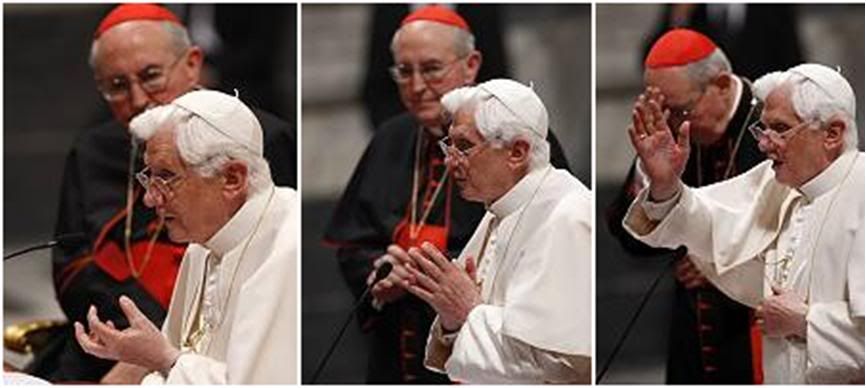 Sandro Magister who, in the past two years, has been keeping track of Benedict XVI's homilies for a book series on the Pope's homilies during the liturgical year (two have now been published), and who is perhaps more particularly attentive to the Holy Father's texts - of any kind - than other Vaticanistas, commented on the Pope's discourse at the Lateran in his blog entry yesterday entitled "On Sunday, everyone to Mass: the Pope rings the bell".
Sandro Magister who, in the past two years, has been keeping track of Benedict XVI's homilies for a book series on the Pope's homilies during the liturgical year (two have now been published), and who is perhaps more particularly attentive to the Holy Father's texts - of any kind - than other Vaticanistas, commented on the Pope's discourse at the Lateran in his blog entry yesterday entitled "On Sunday, everyone to Mass: the Pope rings the bell".
He quotes relevant portions of the Pope's address having to do with trans-substantiation - "a word about the Eucharist which has become out of fashion but is doctrinally pregnant"; with the proper celebration of the Eucharist, not as "exercises in creativity for modern assemblies"; and how Easter made Sunday the Christian day for the Lord.
He ends with the Pope's exhortation that "the celebration of Holy Mass be, in fact, the culmination, the 'load-bearing structure' for the life of every parochial community" and inspire works of charity without which "the Eucharist does not manifest the truth it contains".
[Modificato da TERESA BENEDETTA 17/06/2010 15:05] |
| |
 17/06/2010 14:20 17/06/2010 14:20 |
|
| | | OFFLINE | | Post: 20.406
Post: 3.045 | Registrato il: 28/08/2005
Registrato il: 20/01/2009 | Administratore | Utente Master | |
|
 Benedict XVI to name
Benedict XVI to name
Cardinal Ouellet to Bishops?
NEWS ALERT: In an article today, Andrea Tornielli says that "unless there are improbable, but always possible. last-minute surprises", the Holy Father will soon name Cardinal Marc Ouellet of Montreal to head the Congregation for Bishops.
The news comes after a flurry of reports in recent days that Cardinal George Pell of Sydney, who was all but definitively named by news reports to be the next Prefect of Bishops, ultimately declined the position citing health reasons.
But most news reports claim it is because objections had been raised to his involvement in cases of sexual abuse that had been previously investigated and for which he was cleared.
Damian Thompson summarized the developments regarding Pell this way:
Cardinal Pell is the victim
of a smear campaign designed
to stop him from reforming
the world's bishops

June 16th, 2010
I write this with some urgency. For the last week, Catholic sources have been insisting that Cardinal George Pell, Archbishop of Sydney, will not take up his appointment as Prefect of the Congregation for Bishops. Two reasons are given – one connected to his health, the other to utterly false sex abuse allegations he faced years ago.
I now have good reason to believe that Cardinal Pell – a man of towering presence and intellect, utterly faithful to Pope Benedict’s vision for renewing the Church – is the victim of a smear campaign endorsed by certain bishops, especially Italian ones, who are desperate to stop Pell cleaning up what are in effect the “rotten boroughs” of their dioceses. We must pray that the Holy Father ignores the campaign.
Reason number one: Pell is “in poor health”. True, he has a pacemaker. Otherwise, he’s is reasonably good shape – certainly well enough to take up his position. He’s healthier than many of his elderly critics, sitting in their dioceses doing absolutely nothing that might disturb their sleepy lifestyle.
Reason number two: Cardinal Pell is tainted by sex abuse allegations. This is garbage. The Age newspaper in Australia carries this very revealing report:
Cardinal George Pell, whose promotion to a top Vatican job was expected this month, has been dropped from consideration because of former abuse allegations against him, according to informed sources in Rome.
Cardinal Pell stood down as Archbishop of Sydney in 2002 after he was accused of abusing a teenager at a church camp in the 1960s, but an independent investigation by a retired non-Catholic judge cleared him.
Vatican watchers now say important officials have worked to undermine Cardinal Pell as the next head of the Congregation of Bishops, partly from concerns over negative publicity about the abuse allegations and partly for internal political reasons, including the desire for an Italian to take the job.
But these officials aren’t really concerned about “negative publicity” over allegations that turned out to be lies: they are exploiting those lies to protect themselves.
My question: why should this campaign of black propaganda succeed? Not since the election of Benedict XVI has an appointment so horrified the smug, lazy, liberal establishment in the Vatican and the dioceses.
That’s because Cardinal Pell has detailed knowledge of the situation not only in Italy, where many bishops do about as much to earn their positions as British MPs did before the Reform Act of 1832, but also in Latin America and Asia.
Cardinal Pell’s message to the bishops woud be: “Sorry, gentlemen, but this is not a job for life. You must exhibit evangelical dynamism and obedience to the Holy Father – and, if you don’t, then there are holy priests ready to take your place.” Hence this foul campaign.
If Tornielli's report materializes, then it is not that the 'foul campaign' has succeeded, but that Cardinal Pell himself saw how it could be counter-productive for the Church and for him if he took the job. Cardinal Ouellet enjoys the same excellent stature that Pell has, apparently without any 'abuse' baggage, true or false, and although he apparently has French ancestry, as a Canadian, he is just as familiar as Pell with the affairs of the Anglo-Saxon ecclesial community. Question: Will possible involvement, no matter how marginal, in any sex abuse case, now become an exclusion criterion for choosing Curial officials?
Another Curial rumor reported today is that the Sostituto, or Deputy Secretary of Satte for General Affairs, Mons. Fernando Filoni, is being pushed by certain quarters to be named to head the Congregation for the Evangelization of Peoples, whose prefect, Indian Cardinal Ivan Dias, has long been rumored to be in poor health and set to resign. (Rumors started more than a year ago, but Cardinal Dias is still in place. I hope he remains there as long as possible!)
Filoni is often named as among those Vatican insiders whose agenda is different from the Pope's, but no one has explained why Benedict XVI himself recalled him from his Apostolic Nuncio duty in the Philippines (he was Nuncio to Saddam Hussein's Iraq before that) to take the number-2 post at the Secretariat of State. He was named before Cardinal Bertone took over as Secretary of State when Mons. Leonardo Sandri, who had been Sosituto for 8 years under John Paul II, was named Prefect of the Congregation for Oriental Churches.
The other bishop in the news that I failed to post about yesterday is Mons. Walter Mixa, former Bishop of Augsburg, who has now publicly claimed that pressure from his fellow bishops forced him to resign, and says he intends to present his case to the Pope himself when he meets him at the Vatican next month.
Mixa was accused of having sexually abused one of the altar boys who worked for him in the 1970s, but the supposed accuser immediately came out and denied the report, saying that Mixa had been a good and proper pastor. Likewise, the German police investigating the case decided that it was unfounded and dropped all charges.
However, Mixa was earlier accused of physically beating children when he was a priest, and of using parish funds to buy some items for a personal art collection. He first denied the physical abuse, and then admitted it. When the sexual abuse charge first surfaced, other German bishops immediately asked for his resignation. He did, though he denied the sex abuse charge, and the Pope accepted his resignation.
Fr. Lombardi said yesterday it was unlikely the Pope would reconsider the resignation.
While one must be thankful that Mixa appears clear of the single sex-abuse case that has emerged against him so far (and may there be no more!), he could not have expected to stay on as Bishop of Augsburg, having lied so blatantly about the physical abuse charges at first, and having admitted using church funds to indulge a personal hobby! It goes directly to a question of personal character, as much as guilt for sexual abuse does.
[Modificato da TERESA BENEDETTA 17/06/2010 21:10] |
| |
 17/06/2010 17:17 17/06/2010 17:17 |
|
| | | OFFLINE | | Post: 20.407
Post: 3.046 | Registrato il: 28/08/2005
Registrato il: 20/01/2009 | Administratore | Utente Master | |
|
 Thursday, June 17, 11th Week in Ordinary Time
Thursday, June 17, 11th Week in Ordinary Time
 ST. GIUSEPPE CAFASSO (Italy, 1811-1860), Priest
ST. GIUSEPPE CAFASSO (Italy, 1811-1860), Priest
One of the extraordinary 'social saints' of 19th-century Turin, Joseph was a teacher of John Bosco at the seminary
and encouraged him to establish the Salesian Order. Known from his youth for his humility and prayerfulness, he was
particular vigilant against the prevalent Jansenism in his day and its obsession with sin and damnation. He urged
his students to read Francis de Sales and Alphonsus Liguori to temper Jansenist rigorism. An excellent preacher,
he encouraged daily Communion and devotion to the Blessed Sacrament. He also distinguished himself as a confessor
for condemned prisoners, for which he has been called 'the priest of the gallows'. He died from severe pneumonia.
He was canonized in 1947.
Readings for today's Mass:
www.usccb.org/nab/readings/061710.shtml
OR today.
 Illustration: Dialog between Faith and Reason, Ludwig Seitz, Galleria dei Candelabri, Vatican.
Illustration: Dialog between Faith and Reason, Ludwig Seitz, Galleria dei Candelabri, Vatican.
At the General Audience, the Pope speaks of St. Thomas Aquinas's theological and philosophical method:
'For a broad and trusting view of human reason'
And at Rome's diocesan convention, a reminder that the Eucharist makes us capable of sharing and solidarity
Page 1 international news: The UK government makes its final report on the 1972 Bloody Sunday killings in Northern Ireland, when 17 innocent civilians were killed after British paratroopers shot at a crowd of pro-secessionist demonstrators - British PM Cameron called the action 'unjustified and unjustifiable' [What took them 38 years to come out with the report???]; Obama uses the oil disaster in the Gulf of Mexico to push anew his energy-and-climate bill; hunger threatens Chad, one of the African countries with ongoing civilian conflict also hard hit by the drought in Africa's sub-Saharan Sahel transition zone.
THE POPE'S DAY
The Holy Father met today with
- 8 Bishops of Brazil (Eastern Sector-II, Group 3) on ad limina visit.
NB: The Pope meets individually with these bishops.
- Fr. Alvaro Corcuera Martinez del Rio, Superior-General of the Legionaries of Christ
|
| |
 17/06/2010 18:38 17/06/2010 18:38 |
|
| | | OFFLINE | | Post: 20.408
Post: 3.047 | Registrato il: 28/08/2005
Registrato il: 20/01/2009 | Administratore | Utente Master | |
|

 It was always obvious from the start - especially since he has shown himself remarkably vigorous for his age and medical history - that Benedict XVI's Cross would be to bear endless criticism and character assassination at will by the media, just as physical illness was his predecessor's obvious Cross. Bruno Mastroianni chooses to comment on that today, returning to his column/blog after a few weeks.
Like John Paul II before him,
It was always obvious from the start - especially since he has shown himself remarkably vigorous for his age and medical history - that Benedict XVI's Cross would be to bear endless criticism and character assassination at will by the media, just as physical illness was his predecessor's obvious Cross. Bruno Mastroianni chooses to comment on that today, returning to his column/blog after a few weeks.
Like John Paul II before him,
Benedict XVI has his Cross to bear
Translated from

June 17, 2010
"The world needs the Cross", Benedict XVI said on his recent trip to Cyprus. It is a subject that calls to mind the admirable handover of witness between Papa Wojtyla and Papa Ratzinger.
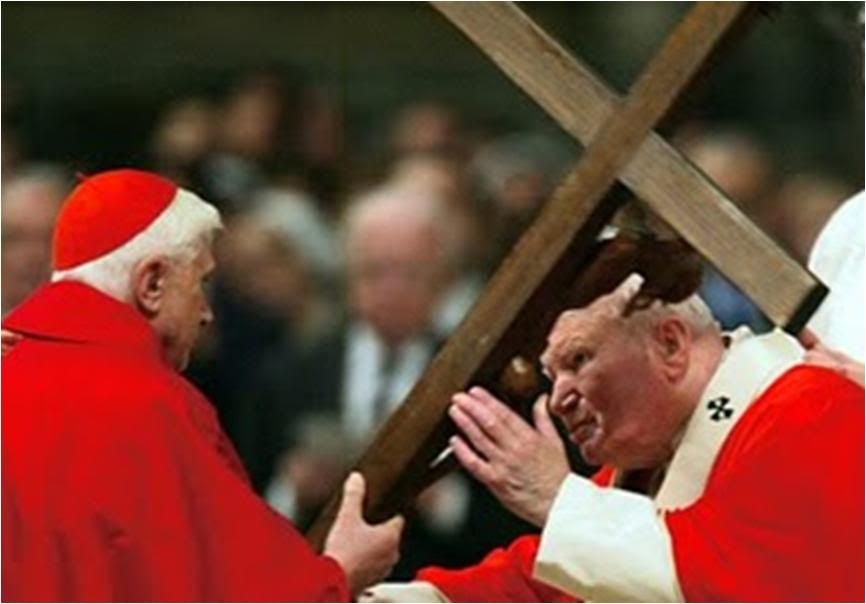
Indeed, the two Church leaders, besides their commitment to make the Church breathe through both lungs (Eastern and Western), on which they had collaborated for decades, something else was passed on: the Cross.
John Paul II, who was the handsome and athletic Pope, the travelling Pope with the broad shoulders, who could stand up to the totalitarian regimes of Eastern Europe, was then afflicted with a physical cross: first, the assassination attempt [which left him physically vulnerable in many ways that were manifested over the years], then a degenerative disease.
And yet, continuing his mission resolutely, he made his very suffering the strong point of his Christian example.
Benedict XVI is undergoing the same destiny. The Pope of scholarship and intelligence, the one who more than any other Pope had already transmitted much of his teaching with great preparation and calm, is carrying the Cross of misunderstanding and the unjust misrepresentation that many in the media have reserved specifically for him.
The beauty of it is that like his predecessor, he continues calmly and forges ahead, focused on acting for the good of the world and the Church, unconcerned by the misunderstandings and wise-ass criticisms.
And doing so, he is succeeding to make the meaning of Christianity tangible - one can endure so much for Love (with a capital L) as to ignore the non-essential 'frills', whether it is good health or good press.
That is, of course, the great horizon of the Cross, which the world needs in order to move ahead.
[Modificato da TERESA BENEDETTA 17/06/2010 20:59] |
| |
 17/06/2010 20:59 17/06/2010 20:59 |
|
| | | OFFLINE | | Post: 20.409
Post: 3.048 | Registrato il: 28/08/2005
Registrato il: 20/01/2009 | Administratore | Utente Master | |
|

 After generally underplaying the Maciel story so manifestly - perhaps because Cardinal Ratzinger/Benedict XVI comes out as the undisputed hero, and they were and still are hellbent on depicting him no matter how baselessly as the arch-villain in the sex-abuse story - suddenly AP makes a big deal of the meeting today between the Holy Father and Maciel's designated successor. Obviously, they have found no new Ratzinger 'zinger' - how long has it been??? [thank God!]
After generally underplaying the Maciel story so manifestly - perhaps because Cardinal Ratzinger/Benedict XVI comes out as the undisputed hero, and they were and still are hellbent on depicting him no matter how baselessly as the arch-villain in the sex-abuse story - suddenly AP makes a big deal of the meeting today between the Holy Father and Maciel's designated successor. Obviously, they have found no new Ratzinger 'zinger' - how long has it been??? [thank God!]
Personally, I think the Pope was doing him the courtesy of telling him personally what he has decided to do with the Legionaries and not let him read it in the news...So we should know quite soon, not give the LC time to spin the meeting as they tried to spin the report of the Apostolic Visitators in a pathetic effort to save face.
Pope meets with head of scandal-tainted
Legionaries pending announcement of delegate

VATICAN CITY, June 17 (AP) - The Pope met Thursday with the head of the Legionaries of Christ before an expected announcement about who will take charge of the conservative order scarred by revelations that its founder sexually abused seminarians and fathered at least one child.
The Vatican said the Legionaries' superior general, the Rev. Alvaro Corcuera Martinez del Rio, met with Pope Benedict XVI in a private audience but gave no details.
The Vatican announced May 1 that the Pope had decided to appoint a delegate to take charge of the order after an eight-month investigation showed that it needed to be profoundly re-evaluated and purified to survive, given the enormous influence the late founder had on it.
The Holy See said the founder, the Rev. Marciel Maciel, had committed grave and "objectively immoral actions" that constituted true crimes in some cases and showed a "life devoid of scruples and authentic religious meaning."
The statement was shocking, since Maciel had enjoyed such favor at the Vatican under Pope John Paul II, who admired the order's conservative bent and its success in bringing in new vocations and fundraising at a time when numbers of priests were on the decline.
Maciel had been dogged for decades by allegations that he had sexually abused seminarians, but the Vatican never took firm action against him. and the Maciel case today stands as one of the most glaring examples of Vatican inaction in the face of sex abuse allegations.
Only in 2006, after on again-off again investigations, did the Vatican sentence Maciel to lead a "reserved life of penance and
prayer," although it didn't say what for. He died in 2008 at age 87.
In February 2009, the Legionaries acknowledged that Maciel had fathered at least one child who is now in her 20s and lives in Spain. And in March of this year it acknowledged that Maciel had also sexually abused seminarians and that two men are claiming to be his sons.
It's not clear what role Corcuera will have in the Legionaries' future. Critics say he and others in the Legionaries' current leadership couldn't have been unaware of Maciel's double life.
In its May 1 statement, the Vatican said Maciel's secret life was "unknown to the great majority of the Legionaries." But it didn't say all were kept in the dark, suggesting that a few must have known something.
In an internal memo sent from Legionaries' headquarters to territorial leaders after the Vatican communique, the Legionaries said that meant that the Vatican had determined that "those who are currently in the leadership of the Legion" didn't know about his misdeeds. [SELF-SERVING AND SHAMELESSLY HYPOCRITICAL! At the very lesat, they did not 'know' because they did not want to know! Even assuming they were not complicit in any way, a sense of 'delicadeza' - propriety, as important in Hispanic culture as 'saving face' is with Asians, although in the opposite direction - should tell them they shoudl all step down adn allow the congregation to start anew, if it must, without all their negative baggage of the 'maciel generations'!]
The communique says no such thing.
Jim Fair, a U.S. spokesman for the Legion, said the memo "wasn't in any way an attempt to interpret or deny or in any way change the
meaning," of the Vatican statement, "but simply to suggest to people that they needed to read it."
Also unclear is the extent of power that the Pope's delegate will have, particularly if the current leadership remains in place. The
Vatican hasn't described the scope of the delegate's work, or whether he will also control the Legionaries' financial assets.
[Obviously those powers will be well-defined by the Vatican when the Pope names the Apostolic Delegate!]
[Modificato da TERESA BENEDETTA 17/06/2010 21:39] |
| |
 18/06/2010 15:40 18/06/2010 15:40 |
|
| | | OFFLINE | | Post: 20.411
Post: 3.049 | Registrato il: 28/08/2005
Registrato il: 20/01/2009 | Administratore | Utente Master | |
|


 B16-and-soccer is not an association one might think of but, this being World Cup season, even L'Osservatore Romano has called attention to something Joseph Ratzinger wrote about the World Cup and soccer years ago, reprinted on the site of Humanitas, that excellent quarterly journal of the Catholic University of Chile, from a 1985 collection of essays by Joseph Ratzinger, Suchen, was droben ist (Seeking what is up there). But it turns out the 1985 essay was a simple updating of a radio broadcast, Zum Sonntag (On Sundays), by the then Archbishop of Munich-Freising on the occasion of the 1978 World Cup. Some time in 2006, I posted a translation of it in the PRF, which I am reposting here. I will add the 1985 'update' afterwards (a re-working of the opening paragraphs):
What's behind the world's
B16-and-soccer is not an association one might think of but, this being World Cup season, even L'Osservatore Romano has called attention to something Joseph Ratzinger wrote about the World Cup and soccer years ago, reprinted on the site of Humanitas, that excellent quarterly journal of the Catholic University of Chile, from a 1985 collection of essays by Joseph Ratzinger, Suchen, was droben ist (Seeking what is up there). But it turns out the 1985 essay was a simple updating of a radio broadcast, Zum Sonntag (On Sundays), by the then Archbishop of Munich-Freising on the occasion of the 1978 World Cup. Some time in 2006, I posted a translation of it in the PRF, which I am reposting here. I will add the 1985 'update' afterwards (a re-working of the opening paragraphs):
What's behind the world's
fascination for football?
by Mons. Joseph Ratzinger
Archbishop of Munich-Freising
June 3, 1978
Translated from
Kirche-im-Ball.de
When one looks at the newspapers or radio and TV programs these days, one can easily see that one subject dominates: the World Cup in football. In 1970, 700 million people watched the World Cup Games on television; this year it will certainly be more.
Football has become a global event which has brought men from all around the world across all boundaries into one and the same ‘place for the soul’, where they are united by hopes, anxieties, passions and joy. Hardly any other event on earth can achieve a similar widespread effect.
That shows that it must address something primal in men and leads us to ask where the power of sport lies.
The pessimist will say, it is like it was in ancient Rome. The word for the masses was ‘panem et circenses' - bread and circuses. Food and play make up the lifestyle of a decadent society which knows of no higher goal.
But even when one accepts this, it is not enough. One must then ask: What is the fascination of play that it can have equal importance as food? One can answer that by looking back at ancient Rome, in which the cry for bread and circuses was really the expression of a desire for a paradisiacal life, for a life of satiety without effort, and of fulfilled leisure.
Because that is what play means: action that is truly free - without a goal and without a need to do it - while harnessing and fulfilling all of one’s personal forces.
In this sense, sport becomes a sort of foretaste of Paradise: a stepping out of the slavish earnestness of our daily life and its concerns into the free seriousness of something that should not be serious and is therefore beautiful.
In that way sport overcomes daily life. But it has another character, especially with children: It is a training for life. It symbolizes life itself carried forward in freeform manner.
It seems to me the fascination of football consists of the fact that it unites both aspects in a very persuasive manner.
It compels a man to take himself in hand so that through training, he may gain control over himself; through control, mastery; and through mastery, freedom.
It also teaches him, however, a disciplined cooperation with others. In team play, he learns to put his individuality in the service of the whole. Sport unites people in a common goal: the success and failure of each one lies in the success or failure of everyone.
And finally, sport teaches fair competition, in which the rules of the game, which everyone mutually supports, binds and unites the competitors. The freedom of playfulness, when everything is played as it should, the seriousness of competition, resolves into the freedom of a completed game.
In watching a game, the spectator identifies himself with the game and the players. He feels himself part of both the team play and the competition, he participates in the players’ seriousness and in their freedom of action. The players become a symbol of his own life; and that works vice-versa. The players know that the spectators are seeing themselves represented in them, being affirmed by them.
Of course, all of this can be spoiled by commercialism, which casts the grim pall of money over everything, and changes sport into an industry which can produce an unreal world of horrifying dimensions.
But this illusory world cannot exist when sport is based on positive values: as training for life and as a stepping over from our daily life in the direction of our lost Paradise.
In both cases however, it means to find a discipline for freedom, to train oneself to follow the rules of teamwork, of competition and of self-discipline. Perhaps if we think of these, we can learn from sport to live anew.
Because sport makes fundamentals visible: Man does not live by bread alone. Yes, the material world is only the preliminary stage for the truly human, the world of freedom. But that freedom is based on rules, on the discipline of teamwork and fair competition, independent of outward success or arbitrariness, and is thereby truly free.
Sport as life. If we look at it profoundly, then the phenomenon of a football-crazy world can give us more than sheer entertainment.
The 1985 introduction:
With its regularity every four years, the World Football Championship has been an event that captivates hundreds of millions of people. Perhaps no other event on earth reaches an audience quite so vast.
This demonstrates that it touches something radical in the human, and we must ask ourselves where the power of sport lies...
In 2006, I posted a link to the original Bayerische Rundfunk broadcast - they resuscitated it on the occasion of the 2006 World Cup - but the link no longer works. A pity, because the voice was something to treasure (I described it at the time as 'the clear bell-like tones of an angel')....
Even more interesting, however, in the Humanitas issue for April-June 2010, are two major articles on the first five years of the Benedictine Pontificate, and the God of Jesus Christ in Joseph Ratzinger... I will post when translated.
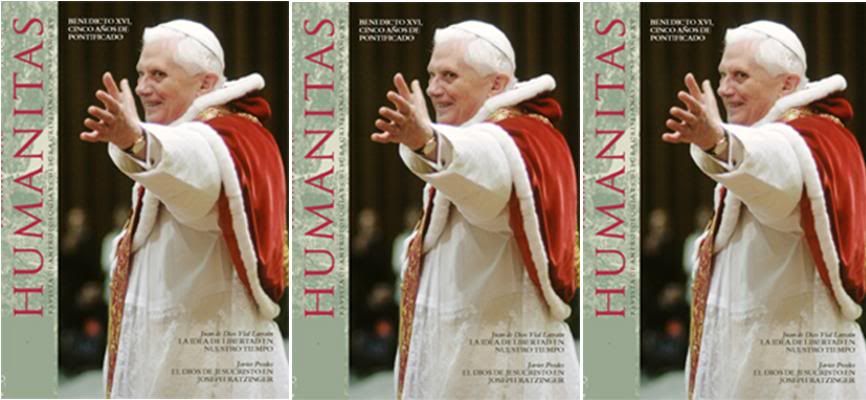
[Modificato da TERESA BENEDETTA 18/06/2010 17:34] |
| |
 18/06/2010 17:05 18/06/2010 17:05 |
|
| | | OFFLINE | | Post: 20.412
Post: 3.050 | Registrato il: 28/08/2005
Registrato il: 20/01/2009 | Administratore | Utente Master | |
|
 Friday, June 18, 11th Week in Ordinary Time
Friday, June 18, 11th Week in Ordinary Time
 Venerable MATT TALBOT (Ireland, 1856-1923), Ex-Alcoholic, Lay Franciscan
Venerable MATT TALBOT (Ireland, 1856-1923), Ex-Alcoholic, Lay Franciscan
Born in Dublin to a working-class family, with a father and brothers who were heavy drinkers, Matt himself
became an alcoholic when he started work at 15 as a messenger for a liquor merchant. He remained an active
alcoholic until he was about 30. One day, he decided to take 'the pledge' to renounce drinking for three months,
while doing penance and going to daily Mass. He renewed the pledge every three months, and eventually for life.
He joined the Franciscan lay order in 1890, read widely under the guidance of a spiritual adviser from a Dublin
college, worked hard as an unskilled construction laborer, and shared his wages with needier persons. He died
of a heart attack on his way to Mass one day. Under his clothes, they found a chain around his waist and cords
around his arms and legs, which he apparently wore as an act of mortification. His story became widely known
and was used by the Church and civic groups to promote temperance among the Irish. The young Karol Wojtyla
wrote a paper about him. Six years after Matt's death, the Dublin Archdiocese started investigating his life
to promote his cause for sainthood. Paul VI recognized his heroic virtues and proclaimed him Venerable in 1973.
Although he is not a saint yet, he is considered in the Anglo-Saxon Catholic world as the patron of alcholics.
Readings for today's Mass:
www.usccb.org/nab/readings/061810.shtml
There is no papal story in today's OR, nor any particularly interesting cultural article.
THE POPE'S DAY
The Holy Father met today with
- Cardinal Ivan Dias, Prefect of the Congregation for the Evangelization of Peoples
- H.E. Hans-Henning Horstmann, Ambassador of the Federal Republic of German, and his wife,
on a farewell visit.
- Cardinal William Joseph Levada, Prefect of the Congregation for the Doctrine of the Faith
(weekly meeting)
VESPERS ON JUNE 28

The Vatican announced that the Holy Father will preside at Vespers on June 28, at 6 pm,
at the Basilica of St Paul outside the Walls, on the eve of the Feast of Saints Peter and Paul.
|
| |
 18/06/2010 17:59 18/06/2010 17:59 |
|
| | | OFFLINE | | Post: 20.413
Post: 3.051 | Registrato il: 28/08/2005
Registrato il: 20/01/2009 | Administratore | Utente Master | |
|

 Three days since the logo for the UK visit was unvelied, and the official site for theevisit has still not incorporated it! When the bishops of Malta and of Portugal unveiled their respective logos before the Pope's visit, they also unveiled the full line of approved logo adaptations. Not to pile on the troubled-enough-as-it-is UK visit organizers, but this, too, is a sign of inadequacy....
Cutting through:
Three days since the logo for the UK visit was unvelied, and the official site for theevisit has still not incorporated it! When the bishops of Malta and of Portugal unveiled their respective logos before the Pope's visit, they also unveiled the full line of approved logo adaptations. Not to pile on the troubled-enough-as-it-is UK visit organizers, but this, too, is a sign of inadequacy....
Cutting through:
British ‘Catholic Voices’ shares
Church teaching on TV and radio
by JOANNA BOGLE, Correspondent

06/18/2010
LONDON — The Church and the mass media have not had an easy relationship in recent months. But a new initiative in Britain looks to change that.
With a papal visit coming in September, and no shortage of controversial material hitting the headlines, a group of lay Catholics came up with a radical new approach. “Catholic Voices” is an independent team of young Catholics who are prepared to go on TV or radio to tackle any issue that comes along.
The general picture for the Church as Britain awaits Pope Benedict XVI’s visit is not a good one.
- The mass media never mentions the Pope without referring to the child-abuse crisis.
- The Times newspaper, among others, has called for his resignation
- A forthcoming TV documentary about him is to be hosted by a leading homosexual-rights campaigner who has previously interrupted Church services and is famous for his passionate opposition to Christian moral teachings.
- Church attendance among all denominations is low, and most pupils at Catholic secondary schools do not attend Mass regularly.
Further, the new government in Great Britain has recently emphasized its support for the homosexual lobby with a celebratory reception for homosexuals attended by Prime Minister David Cameron. Cameron has already voiced his opposition to the Pope on the homosexual rights issue.
In this climate, young Catholic defenders of the Church face many challenges. They will not be debating in a friendly climate.
“We are working for the Church and part of the Church, but in a sense independent of it,” said Jack Valero, a coordinator of the project along with journalist Austen Ivereigh and broadcaster Kathleen Griffin.
“We realized that it is laypeople who should be the experts here. We had the idea of creating a team of people who would be prepared to be trained to speak up in the media, and we put out a call for volunteers. We wondered how many would come forward, but we found huge numbers — they just kept on coming forward, and in the end, we had to close the doors because we had so many.”
The call for volunteers was for Catholics between the ages of 20 and 40.
“We found that several came from the movements — Opus Dei, the Neocatechumenate (the Neocatechumenal Way), Communion and Liberation, and so on — but there are also a good many young people who are simply practicing their faith, living it out, active in their own local parishes and keen to speak up,” said Valero. “I didn’t have so much faith that we’d find so many; I thought we’d have to dig deep. But we were almost overwhelmed by the numbers.”
The project took off this spring. “The plan was to train people from March to July, and then offer them to the media in August,” Valero said. “But the huge publicity over the child-abuse issue of course came up, and so Austen and I had to tackle a lot of media interviews right away in March and April. In a sense, that was a good thing, because it showed the young people the practical realities right from the start. They were meeting us at the training sessions having already seen us on TV, and that gave them a lot of confidence.”
As a director of Opus Dei in Britain, Valero is no stranger to controversy. He was outspoken in the media, for example, when The DaVinci Code film, with its controversial portrayal of Opus Dei, was released.
A genial Spaniard with an easy manner and a good sense of humor, his task in establishing the venture was not only to train the young volunteers, but also to raise funds.
“We worked out that we needed £50,000, and we got a donation of £25,000 right at the start,” he said. “So far, we raised another £12,500, so we are well on the way. The training sessions are going extremely well. There’s a lot of enthusiasm, and I’m impressed with the quality of the people we have recruited.”
People like Daniel Cardona, a psychiatrist; Robert Colquhoun, the author of a book on John Paul II’s theology of the body; Laura Crowley, a barrister; Jim Carr, a pharmacist; and Neil D’Aguiar, a teacher. They have all been attending training sessions in London.
A recent session tackled the question of the Church and science, with talks on different subjects, then discussion, a time for questions, and practice in media tactics.
Volunteer Robert Colquhoun is enthusiastic: “The training so far has been really good: excellent sessions on the moral issues of the day, and then mock-up radio and TV interviews, and sessions where we get to see things from the media point of view. We’re learning that we have to show what we can offer; we have to be ready to help. The interviewer wants to get a good program, and so do we — so we’re all in this together.”
As part of the training, the team has done some live broadcasting with Premier, a Christian radio station, taking part in debates about sex education and contraception.
“The response from the media has been great,” Valero said. “The main problem has often been that a TV or radio program just can’t get a Catholic to come and speak, especially at short notice. I went to the BBC and TV companies to market our team, and the reaction was simply: ‘Yes — we want them!’ We are finding that lots and lots of doors are opening.”
The Voices team is ready to be media commentators. “We’re all very keen and raring to go in the run-up to the Pope’s visit,” Valero said. “I think the project will pay multiple dividends in the longer term, too. It’s great to have a team of down-to-earth people who are prepared to talk in a way that people can understand.”
Valero says their voices are needed.
“The point to remember is that there is so much ignorance about religion and about religious beliefs,” he said. “We need people who can explain the Catholic position simply and clearly — and who are ordinary people; who are teachers or lawyers or working in post offices or whatever — so that the listener will feel Now I understand and perhaps for the first time will see what the Church is saying.”
[Modificato da TERESA BENEDETTA 18/06/2010 18:44] |
| |
 18/06/2010 18:19 18/06/2010 18:19 |
|
| | | OFFLINE | | Post: 20.414
Post: 3.052 | Registrato il: 28/08/2005
Registrato il: 20/01/2009 | Administratore | Utente Master | |
|
 Once in a rare while, an MSM newspaper in the Anglophone world will publish a reader's letter that is favorable to Pope Benedict XVI. This is one of them - I particularly like the point the writer makes about chastity!
Model Pope
Once in a rare while, an MSM newspaper in the Anglophone world will publish a reader's letter that is favorable to Pope Benedict XVI. This is one of them - I particularly like the point the writer makes about chastity!
Model Pope
A letter to the editor

Friday, June 18, 2010
Regarding The Associated Press story "Clerical abuse victims skeptical of pope's promise" (June 12): Although I can't recall the source, I've never forgotten this statement: A priest will either lead many souls into hell with him or he will lead many souls into heaven with him. Pope Benedict XVI is one of the latter.
Long before pedophile priests were front-page news, then-Cardinal Ratzinger pushed for investigation of high-profile clerics, such as the then-archbishop of Vienna and the founder of the Legion of Christ, for sexual crimes.
in 2001, because of the failures of too many bishops, he was given charge of the issue and put in place policies that have improved the process of removing sexual predators from ministry.
Benedict has been falsely accused of being derelict in cleansing this "filth" from the priesthood. Exemplifying the inaccuracy of such accusations was the claim that, as Cardinal Ratzinger, he stopped the Church trial of a priest who abused deaf boys. The trial was not stopped by anyone in the Vatican; rather, the priest died while it was ongoing.
But like other prophets, Benedict has not allowed his opponents to deter him from acting upon, and speaking, the truth.
Just last year, on a trip to Africa, he reaffirmed Church teachings that, unlike dogs in heat, humans are capable of sexual self-control because we are persons, made in the image of God, who can freely choose to live a chaste lifestyle. Clearly, Benedict XVI is a model for all priests to emulate.
Kris Sanders
Squirrel Hill
Pennsylvania
|
| |
 18/06/2010 19:54 18/06/2010 19:54 |
|
| | | OFFLINE | | Post: 20.415
Post: 3.053 | Registrato il: 28/08/2005
Registrato il: 20/01/2009 | Administratore | Utente Master | |
|
 Cuban Catholic Church hopes
Cuban Catholic Church hopes
for papal visit in 2012

HAVANA, June 18 (AP) - A Cuban Roman Catholic bishop says Church leaders on the island hope Pope Benedict XVI can visit the country in 2012.
Emilio Aranguren is bishop of the eastern province of Holguin. He told reporters Thursday that it is the Church's "hope, our interest, that the pope can come to Cuba in the year 2012."
He said such a visit would coincide with the 400th anniversary of the discovery of the image of the Virgin of Charity of Cobre, Cuba's patron saint.
It would be the first papal trip to the communist-run island since John Paul II's historic 1998 Cuba visit.
But, Aranguren noted, "It's up to the Holy See." [One imagines it could be done during a Latin American trip, since other than the trip to Brazil, the Pope has yet to return to a region that is home to more than half the world's Catholics.]
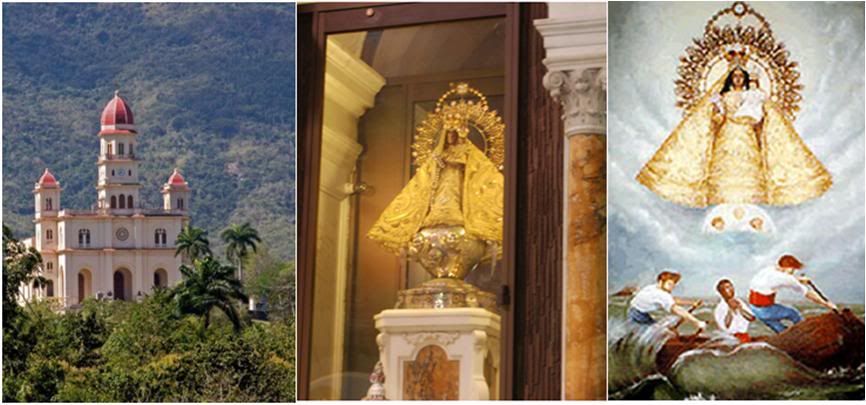 The Virgen del Cobre*, formally Nuestra Senora de la Caridad del Cobre (Our Lady of Charity of El Cobre), is enshrined in Cuba's only Basilica, located near Santiago de Cuba (nearest city to Guantanamo). The copper mining town of El Cobre is in the Sierra Maestra mountain range where Cuban guerrillas under Fidel Castro prepared to march on Havana and eventually deposed dictator Fulgencio Batista.
The Virgen del Cobre*, formally Nuestra Senora de la Caridad del Cobre (Our Lady of Charity of El Cobre), is enshrined in Cuba's only Basilica, located near Santiago de Cuba (nearest city to Guantanamo). The copper mining town of El Cobre is in the Sierra Maestra mountain range where Cuban guerrillas under Fidel Castro prepared to march on Havana and eventually deposed dictator Fulgencio Batista.
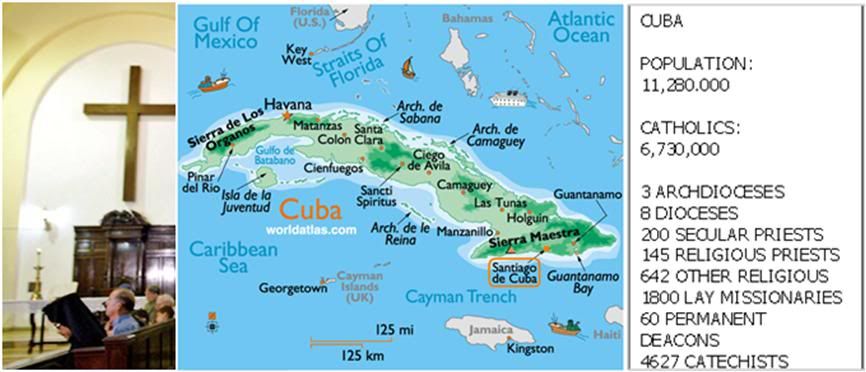
* The 16-inch clay statue was found in the sea after a storm by three Cuban fisherman in 1610. The Virgin of El Cobre was declared Patroness of Cuba by Benedict XV in 1916. John Paul II visited the Basilica in 1998.
|
| |
 18/06/2010 21:47 18/06/2010 21:47 |
|
| | | OFFLINE | | Post: 20.416
Post: 3.054 | Registrato il: 28/08/2005
Registrato il: 20/01/2009 | Administratore | Utente Master | |
|
 Post-script to the Pauline Year
Post-script to the Pauline Year
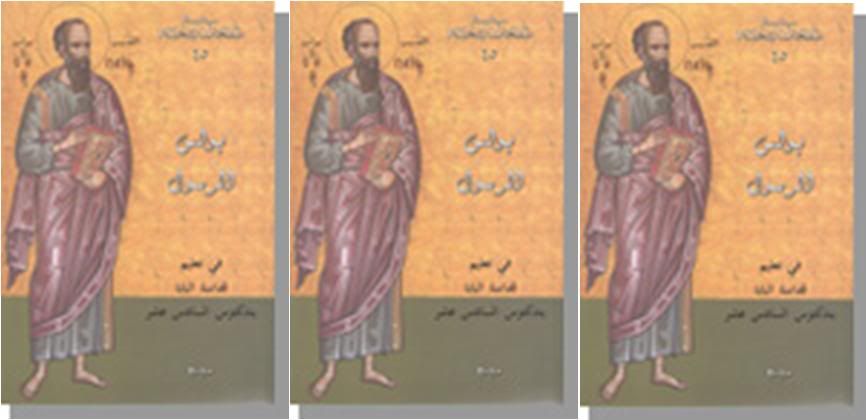 THE APOSTLE PAUL, by Benedict XVI
THE APOSTLE PAUL, by Benedict XVI
Arabic Edition
Oasis/Marcianum Press 2010
Preface to the Arabic Edition:
'The Apostle Paul' by Benedict XVI
by MONS. ANGELO SCOLA
Patriarch of Venice
Translated from
 www.oasiscenter.eu./
www.oasiscenter.eu./
Benedict XVI is a great theologian. And precisely because he is great, is he is able to present the truths of the faith - even the most arduous - with simplicity.
He takes the faithful by the hand and makes them lift their eyes in order to arrive at understanding 'the breadth and length, the height and depth' (Eph 3,18) of the mystery of Christ.
His catecheses on St. Paul are an eloquent example. Given during the Pauline year, they carry the unmistakable mark of the Pontiff, who in 20 brief texts was able to synthesize the principal aspects of the extraordinary personal and ecclesial life of the Apostle of the Gentiles.
Never detached from pastoral concern, Benedict xVI's discourses followed a tendentially chronological order. At the center of these texts, as in life, is the encounter with the Crucified and Resurrected Lord, the authentic heart of Pauline reflection.
It is therefore an honor for the Fondazione Internazionale Oasis to publish, with the support of Kirche in Not (Church in need), the Arabic translation of these catecheses, through the publishing house of the Paulist Fathers.
Even as we hope that this book may inaugurate a series of translations that will offer the Arab public all the extraordinary portraits of the Fathers of the Church and the great Christian writers that Benedict XVI has been depicting over the past few years, we take the occasion to say a word to the principal categories of readers whom we think this book will reach.
First of all, there are, of course, the Catholics of various Eastern rites, who, inthe Middle East, are demonstrating a vitality that is far superior to their numbers.
To know and study the teaching of the Pope is certainly the best way to firm up that gift which the Lord left his disciples: that communio which unites men of different origins and cultures so that they become, to use an original expression of Paul VI, "an ethnic entity sui generis".
But we are equally certain that this book will be welcomed by our Christian brothers from the other Churches and ecclesial movements, especially those of very ancient origins, many of them born in the wake of Paul's original preaching.
To get to the roots of our common faith by following together the principal stages of the life of this Chamipon of the Gospel will be an opportunity to rediscover our common Christian heritage.
Lastly, we hope that this book will also find readers in the Islamic world. We know that various Muslim thinkers and theologians, even before the advent of modern criticism in the 19th century, had expressed strong doubts about the reliability of the Pauline writings, and accused the Apostle of having altered the original Christian message.
The Pope devotes some pages to this hypothesis, pointing out from the Christian perspective those elements which demonstrate the complete continuity of the Pauline preachings and the mission of the Risen Christ.
It is evident to everyone that one of the most urgent necessities of our time is better reciprocal knowledge among the faithful of different religions. Thus it is fundamental that Christians and Muslims can know the view that the other has of its own faith, without reducing it beforehand to one's own pre-conceived categories.
This is the example given us by some of the most important representatives of Arab-Islamic civilization, like the scientist al-Bîrûnî, who, without renouncing his Muslim faith, gave an account of Indian Islamic culture which was so carefully done that it retains all of its documentary value today.
The non-Christian reader can be certain of finding in this book an authoritative presentation of who St. Paul was and the role he plays within Christianity.
To get to know the viewpoint that more than a billion faithful have of this exceptional figure has an undeniable cultural interest. That this viewpoint is well founded can be verified by each reader through an objective comparison with available historical data.

[Modificato da TERESA BENEDETTA 18/06/2010 21:57] |
| |
 19/06/2010 02:08 19/06/2010 02:08 |
|
| | | OFFLINE | | Post: 20.417
Post: 3.055 | Registrato il: 28/08/2005
Registrato il: 20/01/2009 | Administratore | Utente Master | |
|


 Topic for 2010 Schuelerkreis seminar:
Topic for 2010 Schuelerkreis seminar:
Vatican II as renewal in continuity
by Paolo D’Andrea
Adapted and translated from

June 18, 2010
Secolo d'Italia is the newspaper of Silvio Berlusconi's political party, Popolo della Liberta.
On the last weekend of August, Pope Benedict XVI will open the doors of his summer residence in Castel Gandolfo for the sixth year running to his former doctoral students in theology for their annual reunion seminar.
The focus of their discussion this year will be the interpretation of Vatican II, which has been the center of a cultural-theological war since the Council ended in 1965.
The resource person who will deliver the central lecture is the Bishop of Basel (Switzerland), Mons. Kurt Koch, who is expected to be named on July 1 as the new President of the Council for Promoting Christian Unity, succeeding Cardinal Walter Kasper, who is retiring at age 75.
Former Professor Joseph Ratzinger has been holding these annual seminars with his students, known informally as the Ratzinger Schuelerkreis, since 1977.
For the Pope, it is a time of intimacy and informality, a chance to step back into the role of professor-scholar, surrounded by his friends, as they discuss subjects of cultural and theological relevance.
Some 40 of his ex-students, whom he guided through their doctoral dissertations in theology in Bonn, Muenster, Tuebingen and Regensburg, usually attend these seminars. Two years ago, the Schuelerkreis started inviting younger students of Ratzinger's theology to attend the meetings.
This year, the topic is something that has been prominent in this Pontificate. The Bavarian Pope has been presented by opposing camps as someone who has 'ditched' the letter and intent of Vatican II, or as the providential 'whip' seeking to correct all the errors resulting from the wrong reading of the Council.
The young Ratzinger, who was considered the 'enfant prodige' of German theology in the early 1960s, was initially part of the group of reformist theologians in the Second Vatican Council. As the theology consultant for Cardinal Joseph Frings of Cologne, he was responsible for many of Frings's explosive interventions in the Council. Frings, from the beginning, openly opposed the attempted 'domestication' of the Council agenda by the Roman Curia.
Along with other prominent theologians of the day like Rahner and Congar, Kueng and Danielou, Schillebeeckx and Haring, Ratzinger took part in strategy sessions held by the reformist French and German bishops who influenced the input of the Council fathers from central Europe.
But even then, he avoided extremist positions. The model he always followed was a return to the teachings of the Fathers of the Church and to the earliest sources of the faith [ ressourcement], with a simplification that would liberate the Church of the incrustations of time and show her authentic and attractive 'face'.
With constant fidelity to this objective, almost immediately after the Council, Ratzinger began to develop his own critical examination of the roads embarked upon by some of the theologians who were once his colleagues but who now espoused a 'new' post-Conciliar Church.
He felt they embodied a paradoxical 'triumphalism' in claiming to ride the spirit of the times. For example, as early as 1966, in a Hamburg lecture, he expressed his uneasiness at what he considered 'bustling about for the sake of bustle' of those who were preparing to reform the liturgy.
In his first year as Pope, Benedict XVI fully laid out his thinking on the interpretation of Vatican II in his now famous pre-Christmas address to the Roman Curia.
He openly contrasted the misleading hermeneutic of rupture or discontinuity (which postulates a pre-conciliar Church and a post-Conciliar one as different and irreconcilable realities), with the patient but fruitful 'hermeneutic of reform', which allows for renewal in continuity, recognizing that "only principles express the lasting essence", whereas "concrete aspects are not all equally lasting since they depend on the historical situation and can therefore be subject to change".
That address has been used by those who see Vatican II as a Pandora's box that loosed all kinds of evil and caused the weakness that has afflicted the Church in the past four decades.
Meanwhile, it seems like the most strident supporters of the 'hermeneutic of discontinuity' are turning out to be detractors of Vatican II. They claim that the Council Fathers really intended to give birth to a 'new Church', that would 'yield' to the conditions and demands of the contemporary world - and for this, they cite the Vatican-II documents on ecumenism, religious freedom and inter-religious dialog.
But the Pope himself in the December 2006 discourse to the Curia, addressed such 'fixations', noting that some cases of confrontation with the modern world served to rediscover some traditional features of the Church's relationship to the world.
"Vatican II," he said, "with its redefinition of the relationship between the faith and some essential elements of modern thought, has led the Church to re-think or even correct some historical decisions, but in this apparent discontinuity, she has maintained and deepened her own intimate nature and her true identity".
For all this, to seek to make Joseph Ratzinger look like he has 'rejected' or 'repented of' Vatican II is nothing but a fallacious operation.
In 1992, Vatican correspondent Lucio Brunelli asked Cardinal Ratzinger directly if he thought, as others were suggesting, that the time had come for a Vatican-III in order to 'correct' the doctrinal and disciplinary shortcomings of Vatican II.
The Cardinal's response was immediate and unequivocal: "Per carita!" [Italian expression to say, "Please! You can't be serious!"]
Photos of the 2009 Castel Gandolfo seminar
from the website of the Joseph Ratzinger-Benedikt XVI Stiftung:
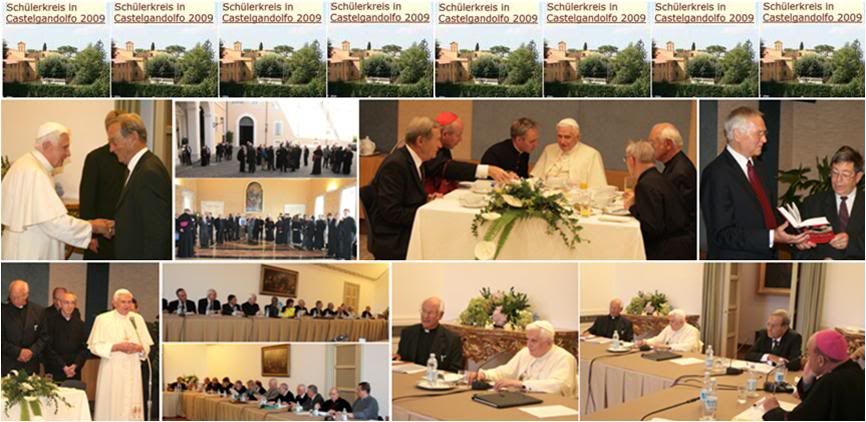
[Modificato da TERESA BENEDETTA 19/06/2010 14:31] |
| |
 19/06/2010 12:21 19/06/2010 12:21 |
|
| | | OFFLINE | | Post: 20.418
Post: 3.056 | Registrato il: 28/08/2005
Registrato il: 20/01/2009 | Administratore | Utente Master | |
|

 This is a Page 1 commentary from OR that I failed to translate promptly.
The audacity of God and
This is a Page 1 commentary from OR that I failed to translate promptly.
The audacity of God and
the opposition of the enemy
by Robert Imbelli
Translated from
the 6/16 issue of

In 2001, on the Solemnity of the Epiphany of the Lord, John Paul II published a magnificent reflection on the experience of the Church which had just celebrated the Great Jubilee of 2000.
http://www.vatican.va/holy_father/john_paul_ii/apost_letters/documents/hf_jp-ii_apl_20010106_novo-millennio-ineunte_en.html
But the Apostolic Letter Novo millennio ineunte (At the beginning of a new millennium) was not simply a looking back with gratitude but a looking ahead with hope. In an original and incisive way, it placed the person of Jesus at the center of the Church's gratitude and hope.
Chapter III was entitled "Starting afresh from Christ" and declares bluntly: "We are certainly not seduced by the naive expectation that, faced with the great challenges of our time, we shall find some magic formula. No, we shall not be saved by a formula but by a Person, and the assurance which he gives us: I am with you!" (29).
An urgent imperative came with this joyous conviction. John Paul II insisted that "all pastoral initiatives must be set in relation to holiness", and calls on all the People of God to 'rediscover the programmatic value' of Lumen gentium, Chapter 5, dedicated to a universal call to holiness.
This task does not concern only some in the Church, but everyone who has been baptized into the new life of Jesus.
Nine years later, on another great feast of the Lord, the Sacred Heart of Jesus, Benedict XVI gave a homily that repeated in many ways his predecessor's exhortations.
Although it was clearly about the gift of the priesthood, since the Church was ending the Year for Priests, it concerned the entire people of God.
Very appropriately on the feast of the Sacred Heart, the Pontiff once again cited a text from the New Testament with which he has a special affinity: John's description of the pierced side of Christ, from which blood and water gushed forth (cfr Jn 19,34),
Benedict, along with the Fathers of the Church, maintains that this image represents the Sacraments of Baptism and the Eucharist, source of new life for the Church.
The Pope said, in words recalling Novo millennio ineunte: "Every Christian and every priest, should, like Christ, become a spring that communicates life to others. We must give the water of life to a thirsting world".
In the nine years between John Paul II's letter and Benedict XVI's homily, there have been numberless testimonials of holiness and dedication on the part of lay Christians and priests.
Unfortunately, there was also the revelation of terrible abuses committed by [a relative few of] those who were called to be ministers of the Gospel. It is no comfort that in the past few decades, an epidemic of abuse has erupted in all of society. The Church is called by the Lord to be a light in the world, not to add to its shsadows.
For this reason, Pope Benedict's homily offers a perspective of fundamental importance and calls on the Church to exercise a more profound discernment.
Although it is certainly important to examine the psychological and sociological conditions that promoted and allowed sexual abuse of minors, it is imperative to recognize that other factors are at work.
In his text, Benedict XVI celebrates joyously the 'audacity' of God, who wants to be present in the world through human mediation [priests]. Nonetheless, he also warns vigorously against the ferocious opposition of 'the enemy' against everything that is holy. [The novel element of Benedict's homily is the open reference to 'the enemy', i.e., the devil, which is among the other concepts Benedict has revived from traditional Catholic teaching: like purgatory, confession, penitence, sin itself - concepts that had come to be forgotten, neglected, or ignored, and practically never mentioned, in the post-Vatican Catholic world.]
The Gospels describe the start of the public ministry of Jesus as having been tormented by the temptations of Satan. It is as though the devil had been present at the Baptism of the Lord and perceived the threat from the Holy One who had been sent to combat the kingdom of Satan.
What he failed to do with Jesus, he continues to try against Christians. The enemy is, in fact, literally anti-Christ, opposed to everything that has to do with the Lord. And he responds to the 'audacity' of Christ by attacking that which is closest to Jesus's heart: the innocence of children and the sacredness of the Eucharist.
In the face of the enemy's opposition, the Church must recommit herself to the Paschal way of the Lord, which is always a way of love in truth: caritas in veritate. As the Pope said in the homily: "It is not love to tolerate behavior that is unworthy of the priest's life".
Among the steps promised by Pope Benedict to avoid more abuses is the need to undertake a more attentive discernment of attitudes towards the priestly vocation and to offer better support in facing the present challenges to the priestly ministry.
In this regard, Novo millennio ineunte offers valuable ideas on the "ctructures of communion' in the Church. These structures are necessary precisely in order to offer vehicles for expressing that spirituality of communion which is the life of the Church.
Indeed, John Paul II wrote: "The new century will have to see us more than ever intent on valuing and developing the forums and structures which, in accordance with the Second Vatican Council's major directives, serve to ensure and safeguard communio" (44).
To this end, a generous commitment to consultation and dialog is fundamental. Spiritual discernment, which is the task of legitimate authorities, is not threatened but improved by commitment to serious consultation.
Here, John Paul II refers to the Rule of Benedict (which is dear to the heart of Benedict XVI): "We need to make our own the ancient pastoral wisdom which, without prejudice to their authority, encouraged Pastors to listen more widely to the entire People of God. Significant is Saint Benedict's reminder to the Abbot of a monastery, inviting him to consult even the youngest members of the community: 'By the Lord's inspiration, it is often a younger person who knows what is best'(Regula, iii,3)" (Novo millennio ineunte, n. 45).
The enemy of mankind is dia-bolos, who hates asnd rips apart communion. The Eucharist is sym-bolos: the great sacrament of communion which creates the Church sempre amanda et purificanda (always loving and purifying). [Also semper riformanda, in the more traditional formulation.]
|
| |
 19/06/2010 14:26 19/06/2010 14:26 |
|
| | | OFFLINE | | Post: 20.420
Post: 3.058 | Registrato il: 28/08/2005
Registrato il: 20/01/2009 | Administratore | Utente Master | |
|
 Better late than never, but not soon enough! The media in Italy and Poland had another field day yesterday (June 18) on a report originating from Poland that the Prefect of the Congregation for Bishops had lifted the canonical restrictions placed on a bishop disciplined in 2002 after accusations of sexual abuse. It seemed a most appetizingly juicy morsel to feed their obsessions after more than 2 months now that MSM has failed to come up with any new 'story'. Their immediate question was: Did Benedict XVI approve the move? Not whether the report was true at all. And yet again, the Vatican Press Office failed to respond quickly. Now it has...
Finally, Vatican denies report
Better late than never, but not soon enough! The media in Italy and Poland had another field day yesterday (June 18) on a report originating from Poland that the Prefect of the Congregation for Bishops had lifted the canonical restrictions placed on a bishop disciplined in 2002 after accusations of sexual abuse. It seemed a most appetizingly juicy morsel to feed their obsessions after more than 2 months now that MSM has failed to come up with any new 'story'. Their immediate question was: Did Benedict XVI approve the move? Not whether the report was true at all. And yet again, the Vatican Press Office failed to respond quickly. Now it has...
Finally, Vatican denies report
that a Polish bishop dismissed
in 2002 for sexual offenses
has been 'rehabilitated'
by Salvatore Izzo
VATICAN CITY, June 19 (translated from AGI) - Vatican press director, Fr. Federico Lombardi, says "it is not true that the Holy See has modified or even lifted the restrictions" imposed in 2002 on the then Archbishop of Poznan, Julius Paetz, who resigned after accusations of sexual molestation levelled against him by some seminarians.
Responding to questions from newsmen on reports that had appeared about Paetz, Lombardi also said it was not a question of 'rehabilitation', but that "correspondence with Rome had to do only with whether he would be authorized to preside at a public liturgy when invited by a parish priest if there was permission from the local bishop".
"The criteria and restrictions set in 2002 and followed to date will not be modified", Lombardi pointed out.
He added that the corollary report that current Archbishop of Poznan, Mons. Stanislaw Gadecki, had threatened to resign if Paetz were 'rehabilitated' is "totally unfounded - as his spokesman said officially yesterday".
[The rumor about Paetz's rehabilitation was accompanied by speculation that Cardinal Re, outgoing Prefect of Bishops, was doing a last favor for Paetz, who worked closely with him when both were ranking bureaucrats in John Paul II's Secretariat of State. But this also implied that Re could not have done so without the approval of Benedict XVI... and Marco Politi, among others, rushed to judgment and immediately wagged fat accusing fingers!
When the story first came out yesterday, Fr. Lombardi only had to lift the phone and ask Cardinal Re - what is this all about? Having found out what it was, he could have issued a statement right away, without waiting to be asked!
I am learning at last that - unless it appears to affect Benedict XVI directly and in a major way - not to post every rumor or speculation that comes out until the dust settles a bit. Especially about Vatican intrigue and battling bishops (as in Germany).
The other continuing story that has occupied Italian media these days is about the supposed involvement of the previous leadership of the Congregation for the Evangelization of Peoples (familiarly known by its old name Propaganda Fide), under Cardinal Crescenzio Sepe, in 2001-2005, in questionable business deals with high-ranking Italian bureaucrats and favored Vatican contractors (one of them was, until recently, a prominent Gentleman of His Holiness under John Paul II). This is a significant question because Propaganda Fide over the centuries has amassed considerable assets and gets substantial contributions from which it finances the activities of missions around the world.
Cardinal Sepe, wnom Benedict XVI replaced at Propaganda Fide with Indian Cardinal Ivan Dias, and named Archbishop of Naples, has said he has nothing to hide. (Sepe, from all accounts, has done an outstanding job in Naples, a difficult challenge for anyone.)
In recent weeks, Cardinal Dias, who is said to have asked the Holy Father for early retirement (he does not turn 75 until next year) because of poor health, has met quite often with Benedict XVI, and there is speculation now in the Italian media that he may get his wish.
Dias has nothing to do with the corruption investigations which concern his dicastery before his time; and in fact, he was chosen to succeed Sepe precisely because, apart from his obvious gifts (he was Archbishop of Bombay, with a reputation for holiness), he also was free of any connections with the Curia or with the Italian bureaucracy.]
[Modificato da TERESA BENEDETTA 19/06/2010 14:29] |
| |
|
|
|
|